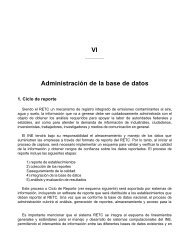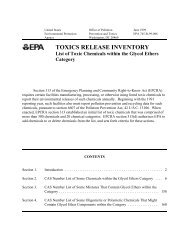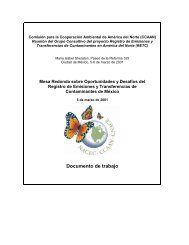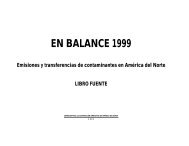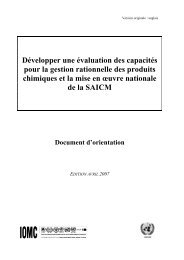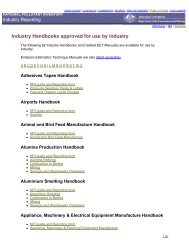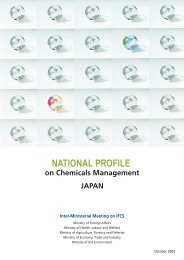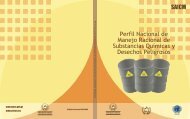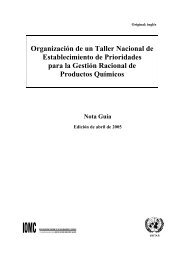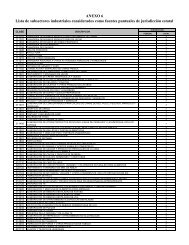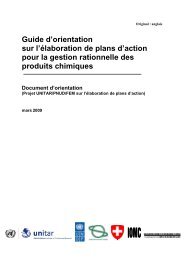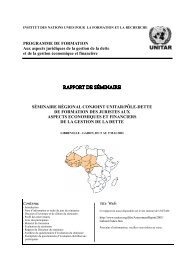GHS Stocktaking Workshop for Southeast, East, and Central Asia ...
GHS Stocktaking Workshop for Southeast, East, and Central Asia ...
GHS Stocktaking Workshop for Southeast, East, and Central Asia ...
You also want an ePaper? Increase the reach of your titles
YUMPU automatically turns print PDFs into web optimized ePapers that Google loves.
Table of Contents<strong>Workshop</strong> Summary .............................................................................................................................. 1Opening Statements .............................................................................................................................. 5Session 1: Introductory Presentations ................................................................................................... 9Session 2: Status of <strong>GHS</strong> Implementation in <strong>Southeast</strong>, <strong>East</strong> <strong>and</strong> <strong>Central</strong> <strong>Asia</strong> .................................. 11Session 3: Linkages between the <strong>GHS</strong> <strong>and</strong> International Chemicals Conventions .............................. 15Session 4: Needs <strong>and</strong> Role of the Health Sector in <strong>GHS</strong> Implementation ........................................... 17Session 5: The Role of Industry, <strong>and</strong> Public Interest <strong>and</strong> Labour Organizations in <strong>GHS</strong>Implementation ................................................................................................................................... 19Session 6: Challenges <strong>and</strong> Opportunities of <strong>GHS</strong> Implementation ..................................................... 23Session 7: Results of Working Group Discussions <strong>and</strong> <strong>Workshop</strong> Conclusions ................................... 25Annex 1: <strong>Workshop</strong> Agenda ................................................................................................................ 35Annex 2: List of Participants ................................................................................................................ 39
<strong>Workshop</strong> SummaryThe workshop involved120 participants from 20regional countries.The “<strong>GHS</strong> <strong>Stocktaking</strong> <strong>Workshop</strong> <strong>for</strong> <strong>Southeast</strong>, <strong>East</strong>, <strong>and</strong> <strong>Central</strong> <strong>Asia</strong>” washeld 15‐17 September 2010 in Beijing, PR China. It was organized throughthe collaboration of the Ministry of Industry <strong>and</strong> In<strong>for</strong>mation Technology(MIIT) of China, UNITAR, ILO <strong>and</strong> WHO, with financial support from theGovernment of Switzerl<strong>and</strong>, the Government of Germany, <strong>and</strong> the EuropeanUnion, as well as contributions from AICM <strong>and</strong> Sinochem. The eventinvolved about 120 participants from 20 countries, representing governmentdelegates from countries of <strong>Southeast</strong>, <strong>East</strong> <strong>and</strong> <strong>Central</strong> <strong>Asia</strong>, relevantindustry <strong>and</strong> public interest groups (including labour organizations <strong>and</strong>NGOs), IGOs, research bodies, <strong>and</strong> bilateral <strong>and</strong> multilateral developmentcooperation agencies. 1The main goal of the workshop was to bring together key representativesfrom governments, business <strong>and</strong> industry, <strong>and</strong> public interest <strong>and</strong> labourorganizations to discuss <strong>GHS</strong> implementation <strong>and</strong> capacity needs. Specificobjectives of the workshop included, inter alia:• to take stock of the status of <strong>GHS</strong> implementation in <strong>Southeast</strong>,<strong>East</strong> <strong>and</strong> <strong>Central</strong> <strong>Asia</strong>;• to share experience <strong>and</strong> approaches to <strong>GHS</strong> implementation;• to explore areas <strong>for</strong> collaboration <strong>and</strong> training;• to ensure that health services are in<strong>for</strong>med about <strong>GHS</strong>;• to examine existing institutions <strong>and</strong> initiatives relevant <strong>for</strong> <strong>GHS</strong> implementation;<strong>and</strong>• to develop joint <strong>and</strong> shared approaches to capacity building at thenational <strong>and</strong> regional levels.The workshop providedlatest in<strong>for</strong>mation regardingthe <strong>GHS</strong> <strong>and</strong> onthe current state of implementationin the region.The first part of the workshop provided the latest in<strong>for</strong>mation regarding the<strong>GHS</strong>, as well as background on the current state of implementation in theregion <strong>and</strong> the role of stakeholders. The second part was focused on thechallenges of <strong>GHS</strong> implementation <strong>and</strong> reviewed the linkages between the<strong>GHS</strong> <strong>and</strong> international chemicals conventions. The third part of the workshop(undertaken mainly in working groups) addressed areas of collaboration– both nationally <strong>and</strong> regionally ‐ <strong>and</strong> reviewed the current challengesto <strong>GHS</strong> implementation, the steps that should be taken to address the challenges,<strong>and</strong> the future issues that will be faced. 21 The list of participants may be found in Annex 2.2 The workshop agenda may be found in Annex 1.1
During the three days, participants considered <strong>GHS</strong> implementation issuesrelated to technical aspects, legal considerations, implementation processissues, <strong>and</strong> regional communication <strong>and</strong> in<strong>for</strong>mation sharing needs. Recommendations<strong>and</strong> outcomes stemming from the discussions included, interalia, the need to communicate the results of <strong>GHS</strong> classifications (<strong>and</strong>consider the need <strong>for</strong> a harmonized regional or international list of classifiedchemicals), share <strong>and</strong> coordinate implementation approaches (e.g. relatedto transition periods <strong>and</strong> implementation time‐frames), strengthenregional <strong>and</strong> inter‐regional in<strong>for</strong>mation exchange <strong>and</strong> collaboration, <strong>and</strong>increase training <strong>and</strong> capacity‐building activities (targeting SMEs in particular)nationally <strong>and</strong> regionally.All materials related to the workshop may be accessed at:http://www.unitar.org/cwm/ghs/events/asia‐stocktaking‐workshop.2
Why is the <strong>GHS</strong> Important?An important aspect of protecting human health <strong>and</strong> the environment from potentiallytoxic chemicals is the development of national systems that ensure thatchemicals are properly classified <strong>and</strong> labelled <strong>and</strong> that safety data sheets aremade available, in particular in the workplace. These communication tools provideworkers, consumers <strong>and</strong> the public with important in<strong>for</strong>mation about thehazards of chemicals (hazard communication) <strong>and</strong> thus help to trigger precautionaryprotective behaviour. For this to be effective, messages must be comprehensible<strong>and</strong> accompanied by appropriate supporting measures. The GloballyHarmonized System of Classification <strong>and</strong> Labelling of Chemicals (<strong>GHS</strong>) is an internationally‐agreedtool <strong>for</strong> chemical classification <strong>and</strong> hazard communication.Countries around the world are using the <strong>GHS</strong> to develop national chemical hazardcommunication systems where those infrastructures are weak or lacking, <strong>and</strong>will need to align existing regulations <strong>and</strong> procedures with the provisions of <strong>GHS</strong>.Additionally, implementation of the <strong>GHS</strong> may require strengthening, updating orestablishing appropriate national legislation. The <strong>GHS</strong> is also compatible with otherinternational instruments such as the ILO Chemicals Convention 170, the Rotterdam,Basel <strong>and</strong> Stockholm Conventions, as well as the Strategic Approach toInternational Chemicals Management (SAICM).<strong>GHS</strong> is also included as a SAICM work area in the Global Plan of Action, including 8distinct activities. In particular, SAICM GPA activity #250 states “Make availablesufficient financial <strong>and</strong> technical resources to support national <strong>and</strong> regional <strong>GHS</strong>capacity‐building projects in developing countries <strong>and</strong> countries with economiesin transition.” Participants at the International Conference on Chemicals Management(ICCM) have stressed the importance of training <strong>and</strong> capacity building<strong>for</strong> implementing the <strong>GHS</strong> as part of SAICM, indicating further international recognitionof the importance of countries <strong>and</strong> regions moving <strong>for</strong>ward to include<strong>GHS</strong> capacity building <strong>and</strong> implementation into overall chemicals managementstrategies <strong>and</strong> national SAICM implementation programmes. The <strong>GHS</strong> is an importanttool that can contribute to achieving sustainable development <strong>and</strong> the MillenniumDevelopment Goals (MDGs) <strong>and</strong> facilitates the implementation of multilateralenvironmental agreements (MEAs).3
Opening StatementsThe inaugural session of the workshop was moderated by Mr. Yuan Longhua,Deputy Director‐General at the Department of Raw Materials Industry, Ministryof Industry <strong>and</strong> In<strong>for</strong>mation Technology (MIIT) of China.This workshop constitutesa very significantopportunity <strong>for</strong>enhancing nationalcapacities on <strong>GHS</strong>implementation inthe countries of theregion.Switzerl<strong>and</strong> appreciatesChina’s willingnessto shareexperiences withcountries from <strong>Asia</strong><strong>and</strong> undertake activitiesas part of thisprocess.The workshop was opened by Mr. Chen Yanhai, Director General at the Ministryof Industry <strong>and</strong> In<strong>for</strong>mation Technology (MIIT) of China, who also delivered thekeynote address of the workshop. In his address he welcomed the participantson behalf of MIIT <strong>and</strong> the Honorable Minister of MIIT, Mr. LI Yizhong. He addedthat this workshop constituted a very significant opportunity <strong>for</strong> enhancing nationalcapacities on <strong>GHS</strong> implementation in the countries of the region. Mr.Chen expressed his gratitude to UNITAR <strong>and</strong> ILO <strong>for</strong> planning <strong>and</strong> organizing theworkshop, <strong>and</strong> acknowledged the financial support of the European Union, theGovernments of Switzerl<strong>and</strong> <strong>and</strong> Germany, Sinochem Corporation, <strong>and</strong> the Associationof International Chemical Manufacturers (AICM), as well as the logisticalarrangements provided by the China National Chemical Economic TechnicalDevelopment Center. He noted the importance of a harmonized system of classification<strong>and</strong> labelling which enhances international cooperation, constituting aconsensus shared by all of the international community. He added that the ChineseGovernment has always paid great attention to environmental protection,people’s health <strong>and</strong> safety, <strong>and</strong> sustainable development <strong>and</strong> that it activelysupports the <strong>GHS</strong>. Furthermore, he said that China is one of the members of theSubcommittee of Experts on the <strong>GHS</strong> (SCE<strong>GHS</strong>) <strong>and</strong> since they joined theSCE<strong>GHS</strong>, many relevant departments <strong>and</strong> organizations have actively promoted<strong>GHS</strong> implementation in China. However, much progress still needs to take placeto reach full implementation of the <strong>GHS</strong>, in particular reviewing or adjustingcurrent laws, regulations <strong>and</strong> st<strong>and</strong>ards related to work safety, occupationalhazards, environmental protection, <strong>and</strong> also to improving the data systems <strong>and</strong>basic research on chemical hazards. In conclusion, he expressed his certitudethat the workshop will generate new ideas <strong>and</strong> results, which will play a veryimportant role in promoting the implementation of <strong>GHS</strong> in the region. He reaffirmedhis gratitude to UNITAR, ILO, WHO, the donors, the speakers <strong>and</strong> allthe participants, wishing them all a successful workshop.Mr. Christoph Lang, First Secretary at the Embassy of Switzerl<strong>and</strong> in China,thanked China <strong>and</strong> UNITAR/ILO <strong>for</strong> the excellent preparation of the workshop.He expressed the appreciation of his Government to see China committed to aleadership role in the further development <strong>and</strong> implementation of the <strong>GHS</strong> atthe regional level. He added that Switzerl<strong>and</strong> appreciates China’s willingness toshare its experiences with countries from <strong>Asia</strong> <strong>and</strong> to undertake activities aspart of this process. He said that the sustainable management of chemicals is akey priority <strong>for</strong> Switzerl<strong>and</strong>, not only at the national level, but also internationally,stressing that Switzerl<strong>and</strong> is host to the main international institutions <strong>and</strong>conventions <strong>for</strong> chemicals <strong>and</strong> waste management, such as the secretariats ofthe Basel, Rotterdam, <strong>and</strong> Stockholm Conventions, UNEP Chemicals, the SAICMSecretariat, UNITAR <strong>and</strong> WHO. He added that chemicals are crucial <strong>for</strong> our dailylife <strong>and</strong> <strong>for</strong> sustainable development. There<strong>for</strong>e, international cooperation is5
important <strong>and</strong> setting an international st<strong>and</strong>ard <strong>for</strong> sound chemical classification<strong>and</strong> hazard communication can act as a show‐case <strong>for</strong> such cooperation. Hesaid that Switzerl<strong>and</strong> is convinced that the multilateral approach taken by the<strong>GHS</strong> is the most effective <strong>and</strong> most efficient <strong>and</strong> this is why Switzerl<strong>and</strong> is committedto its implementation. He concluded by wishing a constructive <strong>and</strong> successfulworkshop to all participants <strong>and</strong> saying that it would be a significant step<strong>for</strong>ward towards the common goal of international cooperation.The EU has been oneof the main donors<strong>for</strong> <strong>GHS</strong> implementationin the region.Germany welcomesworldwide, consistentimplementationof the <strong>GHS</strong>.Mr. Joao Santos, First Secretary of the Delegation of the European Union in China,noted the importance of the initiative of UNITAR/ILO to hold this workshopin China as part of a project to strengthen capacity building at the national <strong>and</strong>regional levels to implement the <strong>GHS</strong> in <strong>Asia</strong>, undertaken with financial supportfrom the EU. He added that the EU has been one of the main donors <strong>for</strong> <strong>GHS</strong>implementation in the region <strong>and</strong> provided an overview of the situation in theEU regarding <strong>GHS</strong> implementation <strong>and</strong> explained, inter alia, the Regulation onthe Classification, Labelling <strong>and</strong> Packaging of Substances <strong>and</strong> Mixtures (CLP) <strong>and</strong>the REACH Regulation. He then highlighted the importance of the global tradein chemicals which is growing very strongly, with the EU <strong>and</strong> <strong>Asia</strong> being leadingexporters <strong>and</strong> importers. The removal of non‐tariff trade barriers is one aspectof <strong>GHS</strong> <strong>and</strong> CLP, but they also improve the protection of workers, consumers<strong>and</strong> the environment. Mr. Santos concluded by saying that the EU was proud tosponsor this initiative <strong>and</strong> wished the participants a productive <strong>and</strong> interestingworkshop.Ms. Cordula Geintz, Second Secretary at the German Embassy, said in her openingremarks that Germany is thankful to the Government of China <strong>for</strong> the organizationof this important event <strong>and</strong> that it was a pleasure <strong>for</strong> the German Governmentto be one of the international supporters. She explained that thechemicals industry has always been a key driver <strong>for</strong> economic success in Germany<strong>and</strong> that the country has learned from the public debate in the 1970sabout environmental pollution <strong>and</strong> hazardous incidents how to move <strong>for</strong>wardwith the sound management of chemicals. She said that her Governmentstrongly believes that sound chemicals management is a prerequisite, not only<strong>for</strong> a safe <strong>and</strong> sustainable manufacturing <strong>and</strong> use of chemicals <strong>and</strong> chemicalbasedproducts but also in order to protect human health <strong>and</strong> the environment.She stated that the German Government welcomes the worldwide consistentimplementation of the <strong>GHS</strong> <strong>and</strong> are glad to support this workshop as a contributionto the WSSD Global Partnership <strong>for</strong> Capacity Building to Implement the<strong>GHS</strong>. She concluded by wishing all participants a successful workshop.Dr. Michael O’Leary, WHO Representative in China, expressed his pleasure toprovide the opening remarks to this workshop on behalf of WHO. He explainedthat chemical products are widely used in almost all societies <strong>and</strong> bring manybenefits to humankind, but can cause harm to health <strong>and</strong> the environment ifused incorrectly. This risk can be reduced by giving people clear in<strong>for</strong>mationabout how to use chemical products safely <strong>and</strong> that in<strong>for</strong>mation needs to becommunicated to the user in a clear <strong>and</strong> unambiguous way. WHO considersthat the <strong>GHS</strong> is an important measure <strong>for</strong> protecting the health of everyonewho uses chemical products, whether they are workers (including health work‐6
WHO is contributingto implementationof the <strong>GHS</strong> in anumber of ways.Successful <strong>GHS</strong> implementationcancontribute to broadersustainable developmentgoals.ers) or consumers, <strong>and</strong> that WHO is contributing to implementation of the <strong>GHS</strong>in a number of ways (e.g. UN SCE<strong>GHS</strong>, the International Chemical Safety Cards,<strong>and</strong> the most recent edition of the WHO Recommended Classification of Pesticidesby Hazard). He added that this workshop is the opportunity to share experiences<strong>and</strong> expressed the wish that representatives from countries that havenot yet implemented the <strong>GHS</strong> take encouragement from the discussions tomove ahead. He concluded by thanking UNITAR, ILO <strong>and</strong> MIIT <strong>for</strong> organizing theworkshop, <strong>and</strong> also the Governments of Germany <strong>and</strong> Switzerl<strong>and</strong>, <strong>and</strong> the EuropeanUnion, <strong>for</strong> their financial support.On behalf of the UNITAR/ILO Global <strong>GHS</strong> Capacity Building Programme, Ms.Anne Herbert, Director of the ILO Regional Office <strong>for</strong> China <strong>and</strong> Mongolia, expressedthe appreciation of the two organizations <strong>for</strong> the long‐st<strong>and</strong>ing association<strong>for</strong> chemicals management with the Government of China. She alsothanked the participants <strong>for</strong> taking part in the workshop, which is a contributionto the World Summit <strong>for</strong> Sustainable Development (WSSD) Global Partnership<strong>for</strong> Capacity Building to Implement the <strong>GHS</strong> <strong>and</strong> building upon the recommendationsmade at the 2007 regional conference held in Jakarta. She acknowledgedthe support of the Governments of Switzerl<strong>and</strong> <strong>and</strong> Germany, the EuropeanUnion, <strong>and</strong> the Association of International Chemical Manufacturers(AICM) <strong>for</strong> financing this <strong>Workshop</strong>, <strong>and</strong> the participation of other partners includingthe WHO. She added that successful <strong>GHS</strong> implementation can contributeto broader sustainable development goals <strong>and</strong> to help reach the MillenniumDevelopment Goals (MDGs). Ms. Herbert added that the three day workshopconstituted the opportunity to share experiences, analyze progress, <strong>and</strong>address next steps <strong>for</strong> <strong>GHS</strong> implementation both nationally <strong>and</strong> regionally. Sheconcluded by wishing all participants a successful workshop.7
Session 1: Introductory PresentationsThis session, which provided in<strong>for</strong>mation related to the workshop <strong>and</strong> latest<strong>GHS</strong> developments, was moderated by Mr. Pavan Baichoo, Technical Officer,ILO. 3The workshop is partof a new regionalproject supported bythe EU during 2010‐2012.Implementationprogress/plans invarious countries<strong>and</strong> regions,including the EU,New Zeal<strong>and</strong>,Australia <strong>and</strong> theU.S.A, werereviewed.Mr. Jonathan Krueger, UNITAR Senior Specialist, provided an introduction to theworkshop, explaining that it was part of a new regional project supported bythe European Union during 2010‐2012. He reviewed the organizational arrangements<strong>for</strong> the workshop <strong>and</strong> acknowledged the financial support of theGovernments of Switzerl<strong>and</strong> <strong>and</strong> Germany, the European Union, AICM <strong>and</strong> SinoChem.The workshop involves approximately 120 participants from 20 countriesin <strong>Southeast</strong>, <strong>East</strong> <strong>and</strong> <strong>Central</strong> <strong>Asia</strong>, representing governments, relevantindustry <strong>and</strong> public interest groups (including labour organizations <strong>and</strong> NGOs),IGOs, <strong>and</strong> research bodies. His presentation outlined the workshop objectives,which consisted, inter alia, to share experiences <strong>and</strong> approaches to <strong>GHS</strong> implementation;explore areas <strong>for</strong> collaboration <strong>and</strong> training; ensure that health servicesare in<strong>for</strong>med about the <strong>GHS</strong>; examine existing institutions <strong>and</strong> initiativesrelevant <strong>for</strong> <strong>GHS</strong> implementation; <strong>and</strong> develop joint <strong>and</strong> shared approaches tocapacity building at the national <strong>and</strong> regional levels.An update on the latest developments regarding the <strong>GHS</strong> was given by Dr. PeterDawson, Principal Scientist, Environmental Risk Management Authority (ERMA)of New Zeal<strong>and</strong>. His presentation reviewed implementation progress/plans invarious countries <strong>and</strong> regions, including the EU, New Zeal<strong>and</strong>, Australia <strong>and</strong> theUnited States. He explained the “building block approach” <strong>and</strong> the differentlevels of implementation <strong>and</strong> what countries are implementing using thebuilding block approach. He presented international activities, including the UNSCE<strong>GHS</strong>, its members <strong>and</strong> observer countries <strong>and</strong> organizations. Regardingtechnical developments in the <strong>GHS</strong>, he explained the different versions of thePurple Book <strong>and</strong> reviewed the updates from Rev.2 to Rev.3, especially regardingthe classification criteria <strong>and</strong> labelling. He concluded by presenting thebiennium workplan of the SCE<strong>GHS</strong> (2009‐2010), stressing the differentimplementation issues that were being addressed.Ms. Mehdia Siari, UNITAR Training Associate, provided an overview of UNITAR<strong>and</strong> the Chemicals <strong>and</strong> Waste Management Programme, noting that this workshopwas the 8 th in a series of regional <strong>and</strong> sub‐regional <strong>GHS</strong> workshops coordinated<strong>and</strong> supported through the UNITAR/ILO Global <strong>GHS</strong> Capacity BuildingProgramme. She explained the different components of the Programme, as wellas the WSSD Global Partnership <strong>for</strong> <strong>GHS</strong> Capacity Building initiated by UNITAR,ILO <strong>and</strong> OECD in 2002. Her presentation focused on UNITAR/ILO work to supportdeveloping <strong>and</strong> transition countries to build capacities <strong>for</strong> <strong>GHS</strong> implemen‐3 All presentations made during the workshop are available at: http://www.unitar.org/cwm/ghs/events/asia‐stocktakingworkshop/presentations.9
UNITAR/ILO engagein activities at theglobal, regional <strong>and</strong>national levels, <strong>and</strong>develop guidance,awareness raising<strong>and</strong> training materials<strong>for</strong> <strong>GHS</strong> implementation.<strong>GHS</strong> in<strong>for</strong>mation is akey element insound chemicalsmanagement.tation, engage in activities at the global, regional <strong>and</strong> national levels, <strong>and</strong> developguidance, awareness raising <strong>and</strong> training materials <strong>for</strong> <strong>GHS</strong> implementation.She presented the past <strong>and</strong> current projects conducted by UNITAR/ILO aroundthe world <strong>and</strong> summarized the activities of the second phase of the <strong>GHS</strong> projectin four ASEAN countries, as well as China. She explained the UNITAR/ILO projectmethodology, which includes, inter alia, <strong>GHS</strong> training <strong>and</strong> awareness raisingworkshops, national situation <strong>and</strong> gap analyses, <strong>and</strong> the development of national<strong>GHS</strong> implementation strategies. She concluded by outlining the resourcesprovided by the UNITAR/ILO Programme, stressing the importance of strengtheningcapacities <strong>for</strong> effective <strong>GHS</strong> implementation.The final presentation in this session was given by Dr. Reiner Arndt, UNITAR SeniorAdvisor, who provided a background on international chemicals conventions<strong>and</strong> sound chemicals management. He also gave an overview of the StrategicApproach to International Chemicals Management (SAICM), stressing itsGlobal Plan of Action which includes 273 activities covering the full life cycle ofchemicals from production to waste. He then gave an overview of <strong>GHS</strong> benefits<strong>and</strong> explained the use of <strong>GHS</strong> in<strong>for</strong>mation as a key element in sound managementof chemicals. Under this point, Dr. Arndt reviewed the priorities, scope<strong>and</strong> responsibilities of sound chemicals management, stressing the role of thedifferent actors involved. He listed some examples of general chemicals legislation,including <strong>for</strong> workers (e.g. ILO 170) that is also related to the <strong>GHS</strong>. He concludedby providing some examples of sound chemicals management, especiallywithin the EU.During the discussion session, questions were raised by participants related tothe definitions used in the <strong>GHS</strong> <strong>and</strong> the fact that classification results can bedifferent from one country to another. Some participants were concernedabout whether the UN SCE<strong>GHS</strong> will issue a single list of classified chemicals inthe future. UNITAR responded that sometimes different data leads to differentclassifications <strong>and</strong> that the interpretation of data can also differ. It was suggestedto have the correct data with the adequate interpretation to minimizethis problem. The elaboration of a single list could be a solution <strong>and</strong> is currentlybeing considered by the SCE<strong>GHS</strong>, but from the experience in the EU in establishingthis kind of list, it can be difficult <strong>and</strong> time consuming. The representative ofConsumers International said that labels should be comprehensive to all <strong>and</strong>asked if they should not be specified to each country, adding that the structureof the chemicals industry can be a challenge, in particular <strong>for</strong> SMEs. Dr. Arndtexplained that all chemical producers have the obligation to label <strong>and</strong> that industryassociations <strong>and</strong> governments should support SMEs, adding that trainingis the key to underst<strong>and</strong>ing labels.10
Session 2: Status of <strong>GHS</strong> Implementation in <strong>Southeast</strong>, <strong>East</strong> <strong>and</strong> <strong>Central</strong> <strong>Asia</strong>This session introduced the results of a study on <strong>GHS</strong> implementation in theregion <strong>and</strong> provided an opportunity <strong>for</strong> countries to provide additional updatesregarding their situation; the session was moderated by Ms. Veronica Chow,Ministry of Manpower, Singapore.Most of the countriessurveyed havea national <strong>GHS</strong>committee involvingall relevant ministries.A second regionalsurvey reported thestatus of <strong>GHS</strong> implementationin China,<strong>Central</strong> <strong>Asia</strong>ncountries, <strong>and</strong> Korea.Professor Hiroshi Jonai, Nihon University, Japan, presented the results of a surveyon <strong>GHS</strong> implementation, conducted in July/August 2010 in collaborationwith <strong>GHS</strong> focal points in the following countries: Brunei Darussalam, Cambodia,Indonesia, Lao PDR, Malaysia, Myanmar, Philippines, Singapore, Thail<strong>and</strong>, Vietnam,<strong>and</strong> Japan. The survey included questions related to ministries involved in<strong>GHS</strong> implementation or coordination committees, the current legal status indifferent sectors, transition or phase‐in periods from existing systems to <strong>GHS</strong>,training <strong>and</strong> capacity building activities, plans <strong>for</strong> 2011‐2012, <strong>and</strong> in<strong>for</strong>mationon related activities (e.g. building block approach, international cooperation on<strong>GHS</strong> implementation, etc). Prof. Jonai explained that most of the countries surveyedhave a national <strong>GHS</strong> committee involving all relevant ministries but thatso far none of the countries has introduced the <strong>GHS</strong> in all four related sectors(industry, agriculture, transport, consumers). Six countries (Indonesia, Malaysia,Philippines, Singapore, Thail<strong>and</strong> <strong>and</strong> Vietnam) have prepared or considered toimplement the <strong>GHS</strong>, while it has been partly implemented in Japan (industrialsector). Other observations show that most of the countries have no comprehensivesystem to classify <strong>and</strong> label chemicals, so the <strong>GHS</strong> is still new to them.Furthermore, there are some countries implementing regulations on the transportof dangerous goods, but mainly <strong>for</strong> air <strong>and</strong> sea transport. In conclusion, henoted that capacity building activities <strong>for</strong> <strong>GHS</strong> implementation in the region willrequire human resources <strong>and</strong> budgetary support to raise awareness on the <strong>GHS</strong>in all sectors. He observed that in some countries there is no <strong>GHS</strong> focal point<strong>and</strong> he urged participants to consider this workshop as a good opportunity tocreate networks <strong>for</strong> communication.The second presentation was made by Professor Jaewook Choi, Director of theInstitute <strong>for</strong> Occupational & Environmental Health at Korea University, with thefindings of the second part of the regional survey on the status of <strong>GHS</strong> implementationin China, <strong>Central</strong> <strong>Asia</strong>n countries, <strong>and</strong> Korea. In Korea, interviewswere conducted by a <strong>GHS</strong> expert with the relevant government departmentssuch as Ministries of Labour <strong>and</strong> Environment. Regarding the status of <strong>GHS</strong> <strong>for</strong>China <strong>and</strong> counties in <strong>Central</strong> <strong>Asia</strong> (Kazakhstan, Kyrgyzstan, Tajikistan, Turkmenistan,<strong>and</strong> Uzbekistan), the websites of relevant Ministries <strong>and</strong> Agencies ofeach county as well as some websites of international bodies (e.g., APEC, UN‐ECE, WSSD) were used as the principal resource. In addition he gave some figureson the comparison of <strong>GHS</strong> classification results in Korea, Japan <strong>and</strong> the EU.He concluded by listing some of the challenges ahead in the implementation ofthe <strong>GHS</strong>.11
Dr. Peter Dawson, ERMA New Zeal<strong>and</strong>, presented the experience with <strong>GHS</strong> implementationin New Zeal<strong>and</strong>, done through the HSNO Act which regulates allhazardous substances in all sectors (except transport). He reviewed the relevantregulations under the Act, noting that its revision will clarify how HSNO codesequate to <strong>GHS</strong> categories. He discussed issues related to implementation, especially<strong>for</strong> classification <strong>and</strong> hazard communication (such as the shortage of experts<strong>and</strong> the issue of hazard based versus risk based labelling), <strong>and</strong> reviewedthe next steps that New Zeal<strong>and</strong> will take <strong>for</strong> <strong>GHS</strong> implementation.The following presentations were made by five countries undertaking a capacitybuilding project to implement the <strong>GHS</strong>, with the assistance of UNITAR/ILO <strong>and</strong>the financial support of the EU. The presentations consisted of a brief overviewof the challenges facing the <strong>GHS</strong> implementation in each country, the lessonslearnt from such experiences, <strong>and</strong> the future key issues to be faced.In Indonesia, a newregulation concerningthe <strong>GHS</strong> waspublished in September2009.Malaysia noted thatASEAN countriesmust share experiences,knowledge<strong>and</strong> in<strong>for</strong>mation.Mr. Eko Pratomo, Ministry of Industry of Indonesia, explained that a new regulationconcerning the <strong>GHS</strong> had been published in September 2009. The transitionperiod <strong>for</strong> the new SDS <strong>for</strong>mat in accordance with the <strong>GHS</strong> will be September2010 <strong>for</strong> single substances <strong>and</strong> December 2013 <strong>for</strong> mixtures <strong>and</strong> the Federationof the Indonesian Chemical Industry (FIKI) is assigned as the “Help‐Desk”<strong>for</strong> <strong>GHS</strong> implementation. He reviewed the results of the first <strong>GHS</strong> capacity buildingproject in Indonesia, undertaken with the assistance of UNITAR\ILO between2005 <strong>and</strong> 2007, as well as the main activities of the new project to beimplemented in 2010‐2012. Mr. Pratomo gave an overview of the implementationobjectives in his country <strong>and</strong> the roles <strong>and</strong> responsibilities of the differentagencies. He explained the procedures used, including an inter‐ministerial team,promoting the <strong>GHS</strong> in the provinces, <strong>and</strong> the national workplan <strong>for</strong> <strong>GHS</strong> implementationin Indonesia.Ms. Mui Huei Gan, Ministry of International Trade <strong>and</strong> Industry, Malaysia, presentedthe challenges facing <strong>GHS</strong> implementation <strong>for</strong> government, industry <strong>and</strong>NGOs including a lack of expertise <strong>and</strong> experienced classifiers <strong>and</strong> translators.There is also lack of coordination between the different ministries <strong>and</strong> lowawareness among industry (especially SMEs) <strong>and</strong> NGOs. She added that researchers<strong>and</strong> academia are supporting capacity building <strong>for</strong> <strong>GHS</strong> implementation<strong>and</strong> that training programmes <strong>and</strong> a database <strong>for</strong> in<strong>for</strong>mation sharing willbe established. At the regional level, ASEAN countries must share experiences,knowledge <strong>and</strong> in<strong>for</strong>mation. She explained that <strong>GHS</strong> is considered by the governmentto be beneficial to the country (e.g. <strong>for</strong> Malaysia’s competitiveness intrade, human well being <strong>and</strong> environmental health) <strong>and</strong> that the country will beinnovative <strong>and</strong> creative in implementing the <strong>GHS</strong>, even with limited resources.She acknowledged the generous support of countries <strong>and</strong> organizations (e.g.AOTS, UNITAR\ILO, WHO, APEC, etc.) <strong>and</strong> said that <strong>GHS</strong> implementation is complex,requiring strong commitment to ensure continuity <strong>and</strong> sustainability. Regardingfuture key issues <strong>for</strong> <strong>GHS</strong> implementation in Malaysia, she said that differentgovernment authorities are governed by different legislations <strong>and</strong> internationalguidelines in the control of chemical substances <strong>and</strong> thus different sectorsmay have different timelines <strong>for</strong> implementation.12
The Philippines haslearned that collaborationamong allstakeholders isneeded <strong>for</strong> successful<strong>GHS</strong> implementation.Thail<strong>and</strong> translatedthe Purple Book <strong>and</strong>signal words <strong>and</strong>hazard statements<strong>for</strong> labelling in toThai.Ms. Angelita Arcellana, Department of Trade <strong>and</strong> Industry of the Philippines,summarized the main challenges as a lack of awareness <strong>and</strong> knowledge ofstakeholders <strong>and</strong> the hazards of chemicals; a lack of resources <strong>and</strong> technicalexpertise of government in <strong>GHS</strong> classification <strong>and</strong> labeling; a lack of resources<strong>for</strong> SMEs to comply with <strong>GHS</strong>; a lack of specific legislation which can cover thefour sectors of <strong>GHS</strong>; a lack of training <strong>for</strong> stakeholders; <strong>and</strong> a lack of in<strong>for</strong>mation<strong>and</strong> educational campaigns on the <strong>GHS</strong>. However, she said that the selection ofthe Philippines by UNITAR as one of the pilot countries in ASEAN <strong>for</strong> its <strong>GHS</strong>training <strong>and</strong> capacity building in 2005 paved the way <strong>for</strong> <strong>GHS</strong> implementationinitiatives. The country has learned that collaboration among all stakeholders(government, industry, <strong>and</strong> civil society) is needed <strong>for</strong> successful <strong>GHS</strong> implementation.The comprehensibility testing conducted during the first <strong>GHS</strong>project emphasized the need <strong>for</strong> awareness raising <strong>and</strong> capacity building of allstakeholders to improve the underst<strong>and</strong>ing of <strong>GHS</strong>‐based hazard communicationtools. A national <strong>GHS</strong> implementation plan was developed indicating theactivities to be undertaken, the responsible or concerned government agency,industry, or civil society group, the resources needed <strong>and</strong> the timetable <strong>for</strong> effectiveimplementation. In conclusion, she listed the key future issues <strong>for</strong> <strong>GHS</strong>implementation including harmonization at the international level <strong>for</strong> agriculturalinputs such as pesticides; the use of the building block approach <strong>and</strong> cutoffvalue/concentration limits; the development of a database with an updatedpriority list of industrial chemicals, consumer chemical products <strong>and</strong> pesticides;<strong>and</strong> determining a source of funding <strong>for</strong> continuous awareness raising <strong>and</strong> capacitybuilding.Ms. Aurus Kongphanich, Food <strong>and</strong> Drug Administration, Ministry of Health ofThail<strong>and</strong>, outlined the lead agencies <strong>for</strong> each sector of the <strong>GHS</strong> <strong>and</strong> their respectiveroles. She explained the roles <strong>and</strong> responsibilities of the interministerialcoordination mechanism <strong>and</strong> its respective committees. She summarizedsome of the achievements of these committees (including the HazardousSubstance Committee ‐ Subcommittee on <strong>GHS</strong>), including the translation ofPurple Book <strong>and</strong> the st<strong>and</strong>ardization of signal words <strong>and</strong> hazard statements <strong>for</strong>labelling in Thai. The National Coordinating Committee on Chemical Safety ‐Policy <strong>and</strong> Plan Subcommittee contributed, inter alia, to enhancing <strong>GHS</strong> awareness<strong>and</strong> the identification of <strong>GHS</strong> as a priority (<strong>and</strong> integrated into the 3 rd NationalMaster Plan <strong>for</strong> Chemical Management). She explained Thail<strong>and</strong>’s NationalStrategic Map <strong>for</strong> <strong>GHS</strong> Implementation (2007‐2011), outlining the differentaspects of the strategy (administrative, legal, etc). The Ministry of Industry<strong>and</strong> the Ministry of Public Health are currently considering issuing ministerialnotifications on <strong>GHS</strong> application of hazardous substances <strong>for</strong> industrial <strong>and</strong> consumerproduct sectors, respectively. Regarding the transition period, she in<strong>for</strong>medthat the proposed period is 1 year <strong>for</strong> substances <strong>and</strong> 5 years <strong>for</strong> mixtures<strong>and</strong> products (regulated under Hazardous Substance Act). She concludedby listing some of the <strong>GHS</strong> training activities at the government level, as well as<strong>for</strong> the private sector <strong>and</strong> labor <strong>and</strong> civil society organizations.13
Session 3: Linkages between the <strong>GHS</strong> <strong>and</strong> InternationalChemicals ConventionsThe objective of this session was to explain the linkages between the <strong>GHS</strong> <strong>and</strong>the main international chemicals <strong>and</strong> waste management conventions. The sessionwas chaired by Mr. Tarcisio Hardman Reis, Programme Officer at the Secretariatof the Rotterdam Convention.The <strong>GHS</strong> is linked tochemicals conventionssuch as Basel,Rotterdam, Stockholm<strong>and</strong> ILO 170.<strong>GHS</strong> implementationwithin an integratedchemicals managementprogrammecan lead to moreeffective national<strong>and</strong> global governanceof chemicals.Dr. Reiner Arndt, UNITAR, reviewed the linkages between the “<strong>GHS</strong> <strong>and</strong> theRotterdam <strong>and</strong> Stockholm Conventions, <strong>and</strong> ILO Chemicals Convention 170”.For each of the three conventions, he listed the articles <strong>and</strong> paragraphs thatrelate to the <strong>GHS</strong> (e.g. requirements <strong>for</strong> classification, labelling, safety datasheets, or hazard in<strong>for</strong>mation provisions) <strong>and</strong> gave examples related to <strong>GHS</strong>implementation under the conventions. Finally, he reviewed the ILO ChemicalsControl Kit designed <strong>for</strong> SMEs in (developing) countries.Dr. Peter Peterson, UNITAR, presented the linkages between the <strong>GHS</strong> <strong>and</strong> theBasel Convention on the Transboundary Movement of Hazardous Wastes <strong>and</strong>their Disposal. Some of the opportunities <strong>for</strong> collaboration between <strong>GHS</strong> <strong>and</strong>the Basel Convention include improving capacities <strong>for</strong> managing both chemicals<strong>and</strong> hazardous wastes using one systematic method; establishing partnershipsinvolving all stakeholders in developing regulatory policies <strong>for</strong> chemicals <strong>and</strong>waste; <strong>and</strong> enabling greater consistency in international treaties <strong>and</strong> nationalregulatory requirements covering the entire product chain (which can contributeto strengthening global principles <strong>for</strong> the sound management of chemicals<strong>and</strong> waste thus protecting human health <strong>and</strong> environment). He concluded thatmore research is required to strengthen the framework <strong>for</strong> application of the<strong>GHS</strong> to the classification of wastes.An overview of the relationship between the <strong>GHS</strong>, international chemicals management,sustainable development <strong>and</strong> the Millennium Development Goals(MDGs) <strong>and</strong> was also given by Dr. Peterson. He explained the “mainstreaming”principle, which results, inter alia, in the inclusion of chemicals in national <strong>and</strong>sector development strategies thereby assisting to achieve the MDGs <strong>and</strong> advancenational development policies. He reviewed each of the eight MDGs toexplain the impact <strong>and</strong> importance of sound chemicals management helping toreach their objectives. The <strong>GHS</strong> is a valuable tool to help achieve some of therecommendations, such as in MDG #7 related to “ensuring environmental sustainability”.In conclusion, he said that the <strong>GHS</strong> hazard classification system,communication <strong>and</strong> educational component, pictograms <strong>and</strong> precautionarystatements are major drivers of chemical safety ‐ the <strong>GHS</strong> within an integratedchemicals management programme can lead to more effective national <strong>and</strong>global governance of chemicals throughout their lifecycles <strong>and</strong>, in coordinationwith international chemicals agreements, provides an essential component ofprocedures <strong>for</strong> achieving sustainable development.15
Session 4: Needs <strong>and</strong> Role of the Health Sector in <strong>GHS</strong> ImplementationThis session was dedicated to considering the needs <strong>and</strong> role of the health sectorin <strong>GHS</strong> implementation. The session was chaired by Ms. Aurus Kongphanichfrom the Food <strong>and</strong> Drug Administration, Ministry of Public Health of Thail<strong>and</strong>,<strong>and</strong> featured presentations on the <strong>GHS</strong> <strong>and</strong> public health <strong>and</strong> control b<strong>and</strong>ing(the international chemical control kit).The health sector isboth a user of <strong>GHS</strong>in<strong>for</strong>mation <strong>and</strong> cancontribute to <strong>GHS</strong>implementation.Ms. Joanna Tempowski, Scientist, World Health Organization (WHO), explainedthe importance of the health sector in <strong>GHS</strong> implementation. She pointed outthat chemical exposures cause the loss of 7.2 million years of healthy life perannum <strong>and</strong> ef<strong>for</strong>ts to prevent <strong>and</strong> mitigate exposure can, there<strong>for</strong>e, make importantcontributions to reducing the disease burden. She reviewed the <strong>GHS</strong>key components <strong>and</strong> highlighted the health‐related in<strong>for</strong>mation found on labels<strong>and</strong> the safety data sheets (SDS). She explained that the health sector was botha user of <strong>GHS</strong> in<strong>for</strong>mation <strong>and</strong> could contribute to <strong>GHS</strong> implementation. Healthworkers are users of <strong>GHS</strong> in<strong>for</strong>mation in two ways. Since they themselves use arange of chemical products (e.g. disinfectants <strong>and</strong> sterilants), the hazard <strong>and</strong>precautionary in<strong>for</strong>mation provided under <strong>GHS</strong> is important <strong>for</strong> self‐protection.In addition, health workers need to treat people exposed to chemicals <strong>and</strong> <strong>for</strong>this the availability of in<strong>for</strong>mation on ingredients, hazards <strong>and</strong> first aid was essential.She added that the health sector is a source of data on exposures <strong>and</strong>can identify when there might be a need to modify implementation. For example,how exposures occur, what are the toxic effects – these need to be adequatelyreflected. During her presentation, Ms Tempowski also stressed theimportance of poisons centres in maintaining product databases, centralizingcollection of data about human exposures <strong>and</strong> acting as centre of expertiseabout toxic effects of chemicals <strong>and</strong> treatment of exposure. She then outlinedthe WHO support <strong>for</strong> <strong>GHS</strong> implementation, <strong>and</strong> described the WHO RecommendedClassification of Pesticides by Hazard <strong>and</strong> the International ChemicalSafety Cards (ICSCs), both of which include <strong>GHS</strong> classifications. In conclusion,Ms Tempowski said that chemical products bring benefits but may also harmhuman health; the <strong>GHS</strong> provides a tool to protect health by in<strong>for</strong>ming usersabout hazards. <strong>GHS</strong> in<strong>for</strong>mation is an important resource <strong>for</strong> the health sector<strong>and</strong> vice‐versa <strong>and</strong> there<strong>for</strong>e the health sector should be included in nationaldiscussions about <strong>GHS</strong> implementation.The second presentation was made by Mr. Pavan Baichoo, Technical Officer atthe International Labour Organization (ILO), regarding “control b<strong>and</strong>ing” <strong>and</strong>the International Chemicals Control Toolkit. He explained that there are manychemical hazards in the workplace <strong>and</strong> that employers need guidance on howto protect workers; however, the availability of technical expertise <strong>and</strong> monitoringequipment may be limited. To address these challenges, “control b<strong>and</strong>ing” –an occupational risk assessment <strong>and</strong> risk management instrument – was developedby occupational hygienists <strong>and</strong> toxicologists. It can be used without onsitetechnical experts <strong>and</strong> expensive exposure measurements <strong>and</strong> is suitable <strong>for</strong>small <strong>and</strong> medium sized enterprises (SMEs). He explained that control b<strong>and</strong>ing17
The InternationalChemicals ControlToolkit is designed<strong>for</strong> SMEs in developingcountries withthe aim of providingsimple <strong>and</strong> practicalmeans to prevent<strong>and</strong> reduce risks ofchemicals.has three elements (hazard, risk of exposure <strong>and</strong> control measures) <strong>and</strong> is called“control b<strong>and</strong>ing” because these are grouped into b<strong>and</strong>s. In addition, the InternationalChemicals Control Toolkit is designed <strong>for</strong> SMEs in developing countrieswith the aim of providing simple <strong>and</strong> practical means to prevent <strong>and</strong> reducerisks of chemicals. He explained the five stages of toolkit operation, hazard classification,<strong>and</strong> the selection of control approaches. He provided the participantssome links on the subject, including the link to the website of the “Programmeon Safety <strong>and</strong> Health at Work <strong>and</strong> the Environment Safety” of ILO which providesfull details on the International Chemical Control Toolkit.During the discussion, a number of issues were raised by participants. In relationto the WHO Recommended Classification of Pesticides by Hazard, this is aclassification of pesticide chemicals rather than <strong>for</strong>mulated products, <strong>and</strong> isbased largely on acute toxicity. The <strong>GHS</strong> classifications are also those <strong>for</strong> acutetoxicity. It was suggested that users of pesticides that were potentially carcinogenicor reproductive toxicants might be misled by a low hazard classificationbased on acute toxicity. Ms Tempowski stated that, in fact, where data wereavailable about longer term hazards such as carcinogenicity, this was taken intoaccount in the classification (so that a pesticide with a low acute toxicity wouldhave a higher classification (1a) if it was also carcinogenic).18
Session 5: The Role of Industry, <strong>and</strong> Public Interest <strong>and</strong> Labour Organizationsin <strong>GHS</strong> ImplementationThis session provided the opportunity <strong>for</strong> representatives of industry bodies <strong>and</strong>public interest <strong>and</strong> labour organizations to provide in<strong>for</strong>mation about <strong>GHS</strong> implementationfrom their perspectives. The session was moderated by Mr. JonathanKrueger, UNITAR.More still needs tobe done to helpSMEs engage in <strong>GHS</strong>implementation.The “building blockapproach” allowsthe selection of hazardclasses <strong>and</strong>categories to designa label that combinesappropriatehazard <strong>and</strong> riskcommunication.AICM has been dedicatedto the promotion<strong>and</strong> implementationof the <strong>GHS</strong> inChina by providingtechnical advice.Ms. Hui Hua Wang, Singapore Chemical Industry Council (SCIC), reviewed theimportance of the chemical industry in Singapore <strong>and</strong> explained the <strong>GHS</strong> task<strong>for</strong>ce in Singapore. She highlighted Singapore’s road map <strong>for</strong> <strong>GHS</strong> implementation,with activities planned until the end of 2013. She explained that the <strong>GHS</strong> isseen as an obligation by industry, <strong>and</strong> that knowledge <strong>and</strong> awareness withingovernment needs further enhancement, especially <strong>for</strong> policy makers. Additionally,while existing preparation <strong>and</strong> training <strong>for</strong> the <strong>GHS</strong> are currently workingwell, more still needs to be done to help SMEs engage in <strong>GHS</strong> implementation.In conclusion, she noted that there remains a lack of expertise <strong>and</strong> competentpersons – both in industry <strong>and</strong> government – related to classification, SDS,<strong>and</strong> labels <strong>and</strong> she expressed the wish to see clearer guidance regarding thetransition from old to new labelling requirements.Mr. Siang‐Hee Tan, Croplife <strong>Asia</strong>, provided a background on agricultural chemicals<strong>and</strong> explained current labelling requirements, noting that use of the “buildingblock approach” is essential to prevent the hazard‐based approach of the<strong>GHS</strong> from undermining the risk based instructions provided on labels. The“building block approach” allows the selection of hazard classes <strong>and</strong> categoriesto design a label that combines appropriate hazard <strong>and</strong> risk communication. Itcan also help to avoid overloading labels with contradictory messages. He saidthat while the <strong>GHS</strong> provides an opportunity <strong>for</strong> globally harmonized hazardcommunication, pesticide labels remain the primary communication tool <strong>for</strong> thefarmer. He added that <strong>for</strong> safe <strong>and</strong> effective h<strong>and</strong>ling, the messages on health<strong>and</strong> safety should be clear <strong>and</strong> transparent. In conclusion he said that the <strong>GHS</strong>could be a positive step <strong>for</strong>ward in globalization of regulations but that it shouldnot undermine the extensive risk assessment process by which agriculturalchemicals are already regulated (both hazards <strong>and</strong> risks need to be evaluated<strong>and</strong> communicated clearly <strong>and</strong> appropriately to the user) <strong>and</strong> that appropriatetransition arrangements are essential to avoid market disruption.Ms. Christina Liu, Association of International Chemical Manufacturers (AICM),remarked that since 2002, AICM has been dedicated to the promotion <strong>and</strong> implementationof the <strong>GHS</strong> in China by providing technical advice to the developmentof regulations <strong>and</strong> st<strong>and</strong>ards <strong>and</strong> bringing the best international practice.AICM has advocated <strong>for</strong> reasonable transition period <strong>for</strong> substances <strong>and</strong> mixtureshad provided input to the development of the Chinese national st<strong>and</strong>ardsregarding <strong>GHS</strong>, including GB 15258 (General rules <strong>for</strong> preparation of precautionarylabel <strong>for</strong> chemicals), GB 13690 (General rules <strong>for</strong> classification <strong>and</strong> hazardcommunication of chemicals), <strong>and</strong> GB/T 16483 (Safety data sheet <strong>for</strong> chemicalproducts content <strong>and</strong> order of sections). To conclude, she made some addition‐19
al suggestions on behalf of AICM, including, inter alia, the importance of havinggreater harmonization of the regulations <strong>and</strong> st<strong>and</strong>ards in China, the need <strong>for</strong> areasonable transition period <strong>for</strong> mixtures, <strong>and</strong> that Chinese st<strong>and</strong>ards be updatedtimely way <strong>and</strong> harmonized with changes to the <strong>GHS</strong>.The experience ofJapan could act as areference <strong>for</strong> thosecountries still planningto introducethe <strong>GHS</strong>.It is important <strong>for</strong>workers to know thehazards specific tochemicals in use, aswell as have in<strong>for</strong>mationabout thespecific protectivemeasures requiredto avoid adverseeffects that might becaused.A survey of consumersorganizationsshowed that there issignificant dem<strong>and</strong><strong>for</strong> <strong>GHS</strong> capacitybuilding at the regional,sub‐regional<strong>and</strong> national levels.Mr. Masahiko Hanzawa, Japan Chemical Industry Association (JCIA), summarizedthe situation of <strong>GHS</strong> implementation in Japan, including the timeframe <strong>for</strong>implementation <strong>and</strong> the results of the classification of substances. He explainedthat JCIA have been actively participating, including in relation to legal issues(such as strengthening in<strong>for</strong>mation infrastructure <strong>and</strong> undertaking educationbe<strong>for</strong>e en<strong>for</strong>cement of the law <strong>and</strong> setting a transition period to allow time <strong>for</strong>this preparation), as well as at the level of cooperation between stakeholders(such as the adjustment of en<strong>for</strong>cement periods <strong>and</strong> the specification of controlledsubstances between related regulations by competent authorities, includingthe important role of industry associations). Regarding future key issues<strong>for</strong> <strong>GHS</strong> implementation in Japan, he highlighted the differences between enterprisesconcerning their ability to adapt to the <strong>GHS</strong>, the necessity to strengthensupport <strong>for</strong> SMEs, <strong>and</strong> the issue of differences in classification. In conclusion,he hoped that the experience of Japan could act as a reference <strong>for</strong> thosecountries still planning to introduce the <strong>GHS</strong>.Mr. Yustinus Bukit Martyr, Chemical, Energy, Mines, Oil & Gas <strong>and</strong> GeneralWorkers Union (FSP‐KEP), provided the perspective of labour organizations highlightingthe importance <strong>for</strong> workers to know the hazards specific to chemicalsin use, as well as in<strong>for</strong>mation about the specific protective measures required toavoid adverse effects that might be caused by those hazards. He affirmed thebenefits of implementing the <strong>GHS</strong> <strong>and</strong> the importance of labels <strong>and</strong> safety datasheets. He suggested that international organizations (such as ILO, UNITAR)provide training material <strong>and</strong> chemical safety recommendations, codes <strong>and</strong>guidelines related to the <strong>GHS</strong> in particular <strong>for</strong> the areas of occupational health,safety <strong>and</strong> prevention <strong>and</strong> the treatment of poisoning. He suggested that governmentsneed to use legal en<strong>for</strong>cement to protect workers, especially thosewho h<strong>and</strong>le chemicals <strong>and</strong> are the most exposed to chemical hazards <strong>and</strong> addedthat companies should provide training on h<strong>and</strong>ling, storing, <strong>and</strong> transportingchemicals, provide appropriate personal protective equipment <strong>and</strong> first‐aid facilities,<strong>and</strong> provide training to treat accidents.Ms. Keya Ghosh, Consumers International‐Kuala Lumpur Office (<strong>for</strong> <strong>Asia</strong> Pacific& the Middle <strong>East</strong>), gave a presentation on the perspective of consumers organizationson <strong>GHS</strong> implementation. She explained that that manufacturing of bulkchemicals has increased in <strong>Asia</strong> in the last ten years <strong>and</strong> that, given the structureof industry in the region, there is a need <strong>for</strong> sound chemicals management<strong>and</strong> implementation of the <strong>GHS</strong>. A regional survey of consumers organizationsin <strong>Asia</strong> showed that there is significant dem<strong>and</strong> <strong>for</strong> <strong>GHS</strong> capacity building at theregional, sub‐regional <strong>and</strong> national levels <strong>and</strong> that there is an urgent need <strong>for</strong>training <strong>and</strong> human, financial <strong>and</strong> technical resources. She suggested thatstrengthening existing networks <strong>and</strong> working groups at different levels shouldbe undertaken by including chemical safety <strong>and</strong> <strong>GHS</strong> issues. She concluded byhighlighting the importance of linking regional <strong>and</strong> international NGO <strong>and</strong> la‐20
our union networks <strong>for</strong> <strong>GHS</strong> in<strong>for</strong>mation dissemination, access to in<strong>for</strong>mation,<strong>and</strong> sharing of experiences with <strong>GHS</strong> implementation.<strong>GHS</strong> elements needto be translated into national languages<strong>and</strong> NGOs canassist by providingin<strong>for</strong>mation <strong>and</strong>undertaking awarenesscampaignsabout the <strong>GHS</strong>.Ms. Muazama Burkhanova, Foundation to Support Civil Initiatives (FSCI)/IPEN,gave a presentation on the “NGO Vision <strong>for</strong> <strong>GHS</strong> Implementation”. She statedthat <strong>GHS</strong> implementation was important as it affects manufacturers, suppliers,transporters <strong>and</strong> users of chemicals. She provided an update regarding <strong>GHS</strong> implementation<strong>East</strong>ern Europe, the Caucasus’ <strong>and</strong> <strong>Central</strong> <strong>Asia</strong> highlighting thatthe <strong>GHS</strong> was discussed in the context of the Custom Union between Belarus,Kazakhstan <strong>and</strong> Russia. In <strong>Central</strong> <strong>Asia</strong>, countries are still preparing <strong>for</strong> implementation<strong>and</strong> many countries are facing problems in implementing the <strong>GHS</strong>(mainly related to a lack of in<strong>for</strong>mation on the <strong>GHS</strong> <strong>and</strong> its importance, lack ofin<strong>for</strong>mation about <strong>GHS</strong> labeling elements such as signal words <strong>and</strong> pictograms,<strong>and</strong> a lack of timeline <strong>for</strong> implementation). <strong>GHS</strong> elements need to be translatedin to national languages <strong>and</strong> NGOs can assist by providing in<strong>for</strong>mation <strong>and</strong> undertakingawareness campaigns about the <strong>GHS</strong>. NGOs can also work with industry<strong>and</strong> governments to adapt labels to new regulations <strong>and</strong> work with allstakeholders to ensure the inclusion of precautionary statements that help toprevent or minimize the adverse effects of hazardous chemicals on humanhealth.During the discussion session, the speakers were asked to answer questions ofparticipants. A representative of the Chinese delegation noted that transport<strong>and</strong> storage issues were not explicitly addressed in this workshop.21
Session 6: Challenges <strong>and</strong> Opportunities of <strong>GHS</strong> ImplementationThis session was dedicated to addressing key challenges <strong>and</strong> opportunities of<strong>GHS</strong> implementation. Participants were requested, in working groups, to reflecton national experiences with <strong>GHS</strong> implementation across the key sectors fromthe perspective of government, industry, <strong>and</strong> public interest <strong>and</strong> labour organisations.Participants divided in to groups to discuss challenges <strong>and</strong> opportunitiesaround four separate themes.Participants weresuggested to considerthe currenttechnical challengesto <strong>GHS</strong> implementation.What are possibletransition periods<strong>for</strong> implementationof the <strong>GHS</strong> <strong>and</strong> whatare the obligations<strong>for</strong> imported chemicals?What are nationalexperiences withprogress towards<strong>GHS</strong> implementation?For each theme, a short “thought starter” presentation, with suggested guidancequestions intended to stimulate discussion, was provided. For theme 1 on“Technical aspects” of <strong>GHS</strong> implementation, participants were suggested toconsider the current technical challenges to <strong>GHS</strong> implementation (e.g. differencesin classification results using <strong>GHS</strong> criteria; application of the ‘buildingblock’ approach; lack of agreed international lists of classified chemicals, etc),what steps needs to be taken by stakeholders (especially government <strong>and</strong> industry)to overcome these challenges in a coordinated way, <strong>and</strong> what furthertechnical issues will be faced in the future <strong>and</strong> how should all stakeholders prepareto address them.The second theme <strong>for</strong> the working group discussions was related to the “Legalaspects” of <strong>GHS</strong> implementation. For this theme, participants were invited todiscuss the scope of legislation required, including the areas covered, whichbuilding blocks are used <strong>and</strong> what are the responsibilities of the different keyactors. In addition, participants were invited to think about how the <strong>GHS</strong> is regulated,using national experiences as examples. For example, are new lawscreated or were existing laws modified? What are possible transition periods<strong>for</strong> implementation of the <strong>GHS</strong> <strong>and</strong> what are the <strong>GHS</strong> obligations <strong>for</strong> importedchemicals? How will legal <strong>GHS</strong> implementation be assured (e.g. by support/guidanceto industry, list(s) of classified substances, awareness raising <strong>and</strong>training, sanctions <strong>for</strong> violation, etc)?For theme 3 on “Implementation process issues”, participants were invited todiscuss their national experiences with progress towards <strong>GHS</strong> implementation.Issues that could be considered included: what is the framework <strong>for</strong> monitoring<strong>and</strong> evaluation, what resources are available, what is the role of the competentauthorities, the value of having national “road maps” (<strong>and</strong> what if they are different?),how to use the building blocks, <strong>and</strong> the role of the different sectors in<strong>GHS</strong> implementation.23
What regionalcommunication <strong>and</strong>in<strong>for</strong>mation sharingissues will be facedin the future?For theme 4 on “Regional Communication <strong>and</strong> In<strong>for</strong>mation Sharing” it was suggestedthat participants discuss the current regional communication <strong>and</strong> in<strong>for</strong>mationsharing challenges to <strong>GHS</strong> implementation (e.g. identification of regionalfocal points; plat<strong>for</strong>ms <strong>for</strong> regional in<strong>for</strong>mation exchange, etc), what stepscould be taken by stakeholders to overcome these challenges in a coordinatedway (e.g. regional plat<strong>for</strong>ms <strong>for</strong> in<strong>for</strong>mation exchange, tracking of progress,learning from experiences to date, <strong>and</strong> planning <strong>for</strong> the future), <strong>and</strong> what furtherregional communication <strong>and</strong> in<strong>for</strong>mation sharing issues will be faced in thefuture <strong>and</strong> how should all stakeholders prepare to address them.24
Session 7: Results of Working Group Discussions <strong>and</strong> <strong>Workshop</strong> ConclusionsThe last session of the workshop was dedicated to reporting the working groupdiscussions on the four themes (technical aspects, legal issues, implementationissues, <strong>and</strong> regional communication <strong>and</strong> in<strong>for</strong>mation sharing). The session wasmoderated by Professor Mazlin Bin Mokhtar, Universiti Kebangsaan Malaysia(UKM), who gave thanks to all participants <strong>for</strong> their input <strong>and</strong> to the chairs <strong>and</strong>rapporteurs of the various working groups. He welcomed the ef<strong>for</strong>ts made bythe participants to come up with concrete solutions to challenges <strong>and</strong> proposeways to move <strong>for</strong>ward with <strong>GHS</strong> implementation in the region.7.1 Theme 1: Technical aspects <strong>for</strong> <strong>GHS</strong> implementationCurrent challengesFor Government:• The process of classification <strong>and</strong> different sets of data– better guidance is needed on how to interpret or what set ofdata to be used– set up a <strong>GHS</strong> working group to develop a harmonised list ofchemicals of high concern based on the existing classificationsfrom Japan, Korea <strong>and</strong> EU• No available list of industrial chemicals (criteria such as high productionvolume, common definitions agreed by countries, carcinogenicity, etc.)– the ASEAN Secretariat or APEC could assist to develop anASEAN list• Use of different building blocks by different countriesFor Industry:– Set up a working group to take into consideration the experienceof countries in implementing <strong>GHS</strong>– Look into process of <strong>GHS</strong> implementation– Fixed guidelines would be useful• Laboratory data produced in some countries are not accepted internationally– there is a need <strong>for</strong> mutual recognition agreement• The issue of confidential business in<strong>for</strong>mation (CBI) <strong>and</strong> when it can beused• Does waste need to be harmonized with <strong>GHS</strong>? There is a need <strong>for</strong>guidelines to consider it as mixtures or as a separate classification25
– In the long term, consider classification of domestic wastes asindustrial wastes• Consider a legally‐binding instrument <strong>and</strong> mechanism <strong>for</strong> implementationin the longer termFor Public interest <strong>and</strong> labour organizations:• Need <strong>for</strong> capacity‐building– Training programmes that will lead to st<strong>and</strong>ards– Lack of technical experts within the region• Use of dual languages <strong>for</strong> SDS• Too many precautionary statements– Limited to up to 6 phrases (criteria <strong>for</strong> prioritization?) in somecountries• Different supplier with different SDS – how to harmonize?Steps to be takenRegarding the steps to be taken by stakeholders to overcome these challengesin a coordinated way, she reported the following:• Need <strong>for</strong> a close partnership among government <strong>and</strong> industry• Use of UNITAR guidance documents (e.g. the Companion Guide to thePurple Book, Guidance on how to implement a <strong>GHS</strong> National Strategy,etc)• Need <strong>for</strong> train‐the‐trainers approaches• Specialized training <strong>for</strong> the private sector, consumer products <strong>and</strong> thehealth sector• Inventory of where resources are in terms of expertise (government<strong>and</strong> industry)• improved access to existing training materials (e.g. UNITAR/ILO)• Use of best practices <strong>for</strong> implementing <strong>GHS</strong>• Coordination within <strong>and</strong> between regions (e.g. ASEAN, APEC)• Clearing‐house <strong>for</strong> in<strong>for</strong>mation exchange (UNITAR?)26
• Develop an acceptable database of chemicals (e.g. OECD web Portal)• Develop software to classify mixtures (METI‐Japan) ‐ to be translatedinto English• Government to involve <strong>and</strong> provide incentives to academia as part ofthe pool of technical expertsIssues <strong>for</strong> the futureFinally, the recommendation of the working groups regarding the further technicalissues that will be faced in the future <strong>and</strong> how stakeholders should prepareto address them, she reported the following:• What is the coping mechanism of countries to adopt changes?– Need <strong>for</strong> countries to observe/discuss be<strong>for</strong>e implementing• Nanomaterials/articles– Research, in<strong>for</strong>mation exchange among countries – APEC scientificgroup• To create an “e‐group” <strong>for</strong> participants in this meeting to follow up onworkshop recommendations• Ensure regular updates on <strong>GHS</strong> implementation (e.g. UNECE website)• International organizations need to harmonize <strong>GHS</strong> within their systems(e.g. FAO, WHO, etc.)• Testing by using alternatives• Seek technical support to improve laboratory tests• Risk communication – “right to know <strong>and</strong> obligation to in<strong>for</strong>m”.After the summary presentation, the floor was opened <strong>for</strong> discussion. A representativefrom the Chinese delegation explained that a list <strong>for</strong> industrial chemicalsis important <strong>and</strong> that it could better define the <strong>GHS</strong>. He also stated that <strong>for</strong>the classification of substances, the objective is to harmonize but the experienceof countries in the region showed some differences. He supported therecommendation to establish a list of harmonized classified substances in theUN SCE<strong>GHS</strong>. Other participants suggested setting up a <strong>GHS</strong> working group underthe <strong>Asia</strong>‐Pacific Economic Cooperation (APEC) Secretariat <strong>and</strong>/or the ASEANSecretariat, <strong>and</strong> the idea of an “e‐group” <strong>for</strong> the participants of the workshopwas also raised. A participant from Japan confirmed that Japan will undertakefurther <strong>GHS</strong> training in the region. Other participants asked questions related tothe availability of training tools <strong>and</strong> resources. Jonathan Krueger, UNITAR, en‐27
couraged the member countries in the UN SCE<strong>GHS</strong> to participate in the discussionsabout establishing a list of classified chemicals <strong>and</strong> he encouraged theASEAN countries to approach the ASEAN Secretariat regarding a <strong>GHS</strong> workinggroup (or integrating the <strong>GHS</strong> in to existing working groups). He confirmed thatUNITAR is finalizing basic <strong>and</strong> advanced training courses on the <strong>GHS</strong> that will beavailable in 2011, in addition to the other existing guidance <strong>and</strong> support documents.UNITAR indicated that it would be willing to assist to establish an “e<strong>for</strong>um”<strong>for</strong> participants of the workshop to share in<strong>for</strong>mation <strong>and</strong> experienceswith <strong>GHS</strong> implementation but also encouraged countries to use the UNECE <strong>GHS</strong>website to access more in<strong>for</strong>mation <strong>and</strong> provide regular updates to be publishedon that website. 47.2 Theme 2: Legal aspects <strong>for</strong> <strong>GHS</strong> implementationMr. Goh Choo Ta (UKM) presented the results of the working group discussionson theme 2, “legal aspects <strong>for</strong> <strong>GHS</strong> implementation”. He noted that it can bedifficult to distinguish between recommendations <strong>for</strong> government, industry <strong>and</strong>NGOs, but that most of the recommendations under this theme emphasize therole of government since they are responsible <strong>for</strong> the legal aspects of <strong>GHS</strong> implementation.The recommendations made by the working groups <strong>for</strong> the legal aspects werethe following:• If the <strong>GHS</strong> is incorporated into existing legislations (either via ministerialnotifications, or administrative orders, etc), the competent authoritymust then ensure that <strong>GHS</strong> elements are adequately addressed. Thiscan be done by having stakeholder consultation workshops <strong>and</strong> publiccomments.• Appropriate building blocks should be identified.• Competent authorities should organize awareness raising seminars <strong>for</strong>the decision makers. The content of the seminars should cover an introductionto the <strong>GHS</strong>, why we need the <strong>GHS</strong> <strong>and</strong> benefits of <strong>GHS</strong> implementation(including enhancement of protection of human health<strong>and</strong> the environment as well as facilitating chemical trade across borders).• <strong>GHS</strong> related legislation should cover all hazardous chemicals.• Competent authorities should establish mechanism to strengthen inter‐4 http://www.unece.org/trans/danger/publi/ghs/implementation_e.html28
agency collaboration to ensure that all relevant agencies within thecountry are aware of <strong>GHS</strong> <strong>and</strong> later to share their knowledge <strong>and</strong> experiencesthat contribute to the <strong>GHS</strong> implementation.• Competent authorities should establish mechanisms to incorporate latestversion of the <strong>GHS</strong> Purple Book into their respective regulations.• Competent authorities should identify appropriate transition periods<strong>for</strong> <strong>GHS</strong> implementation. While countries are free to determine theirrespective transition periods based on their needs, the decisions aboutthose transition periods should be conveyed to (<strong>and</strong> if possible, coordinatedwith) other countries <strong>and</strong> organizations.• <strong>GHS</strong> training should be part of the <strong>GHS</strong>‐related regulations to ensurecompetency of the classifiers <strong>and</strong> users.• Competent authorities should allow “over labeling”.• Competent authorities should establish inspection tools to ensure <strong>GHS</strong>compliance <strong>for</strong> which two possible approaches could be to have en<strong>for</strong>cersthat carry out inspections at company premises or to inspectchemical labels <strong>and</strong> SDS that are available on the market.In conclusion, Mr. Goh said that en<strong>for</strong>cement can be a driving <strong>for</strong>ce <strong>for</strong> <strong>GHS</strong>implementation. He added that if the awareness of social responsibilities is lacking,then the ‘right to know’ should be complemented by en<strong>for</strong>cement.During the discussion session, several participants suggested that the approachof updating the Purple Book every two years is confusing because it is not practicalto also update legislation every two years. A participant from Singaporeagreed that those countries implementing the <strong>GHS</strong> find it difficult to adapt tothe latest versions of <strong>GHS</strong> because it is very costly <strong>and</strong> difficult <strong>for</strong> industry tochange the labels. A participant from Indonesia raised the issue of “overlabelling”where in some cases several pictograms are found in a same product.A participant from the Chinese delegation asked if the <strong>GHS</strong> could be “upgraded”to be a Convention (such as <strong>for</strong> POPs). Reiner Arndt, UNITAR, repliedthat is highly unlikely (<strong>and</strong> perhaps not desirable) to make the <strong>GHS</strong> in to a legallybinding instrument, as national approaches are needed; however, as discussedin the workshop, there already are links between the existing chemicalsconventions <strong>and</strong> the <strong>GHS</strong>.29
7.3 Theme 3: <strong>GHS</strong> implementation issuesThe results of the discussions on the third theme, “implementation issues”,were presented by Muazama Burkhanova (FSCI/IPEN).Current challenges• The issue of labelling of consumer products• How to implement <strong>GHS</strong> in countries not yet implementing (e.g. how toobtain the necessary technical expertise)• Linking <strong>GHS</strong> to mainstreaming <strong>and</strong> sound chemicals management ingeneral• Lack of regular meetings on <strong>GHS</strong>• Low awareness among policy‐makers• Need to share updates among different countries.Steps to be taken• Designate a “<strong>GHS</strong> Champion” in each country• Create a <strong>GHS</strong> Task Force or Committee, including relevant ministries,industry, academia <strong>and</strong> civil society• Engage all relevant stakeholders• Develop a national policy of <strong>GHS</strong> implementation• Develop a Road Map to promoting the <strong>GHS</strong> (including a gap analysis,development of guidelines, capacity building, awareness raising, etc.)• Compliance assistance ‐ set st<strong>and</strong>ards• Develop national/international collaborations – experts group• Develop indicators to show the way <strong>for</strong>ward• Access the resources <strong>and</strong> time needed <strong>for</strong> implementation• Engage in comprehensibility testing to gauge the worker’s perception –workers, supervisors <strong>and</strong> managers level• Capacity‐building <strong>and</strong> training, including inspection (workplace, marketcontrol), different seminar <strong>for</strong> workers, industry to provide a ‘help desk’30
Translate the Purple Book (proofread <strong>and</strong> peer‐reviewed)Issues <strong>for</strong> the future• Mainstreaming of chemicals• Governments will need to have ownership <strong>and</strong> accountability• Good coordination will be needed within countries (useful to have focalpoints)• Continued support from international organizations• Need <strong>for</strong> multinationals to be on‐board –added value• Cooperation with industry <strong>and</strong> multinationals• Strategies <strong>for</strong> how to make the <strong>GHS</strong> a realityDuring the discussion session, participants (especially from <strong>East</strong> <strong>Asia</strong>), stressedthe importance of coordination among the different ministries involved in <strong>GHS</strong>implementation <strong>and</strong> the important roles of NGOs. The issue of the <strong>GHS</strong> PurpleBook only being available in the United Nations official languages was also discussed.Many countries expressed difficulties to find competent translators <strong>and</strong>the required funds to translate the Purple Book <strong>and</strong> other <strong>GHS</strong> guidance documentsinto local languages. A participant from China provided an overview of<strong>GHS</strong> coordination in his country, explaining the role <strong>and</strong> responsibilities of theinvolved departments.7.4 Theme 4: Regional CommunicationThe summary of the results of discussions under Theme 4 on “regional communication”was provided by Mr. Foon Weng Lian (FOMCA), as the following:Current challenges• Regional in<strong>for</strong>mation dissemination is not adequately addressed.• Lack of cooperation between all stakeholders <strong>and</strong> also among regions.• Confidential data in the business is not being disclosed.• The number of <strong>GHS</strong> experts is insufficient.• Lack of funds to complete implementation strategies.• Commitment from all the stakeholders not consistent.31
Steps to be takenParticipants suggested six tools/approaches to be used <strong>for</strong> sharing in<strong>for</strong>mationat the regional level:• More meetings are needed.• Develop a website which can be accessed by all the sectors.• Use electronic plat<strong>for</strong>ms as a <strong>for</strong>um <strong>for</strong> providing relevant updates onthe <strong>GHS</strong>, lists of laboratories which can conduct chemical testing, etc.• Develop case studies of country experience <strong>for</strong> the educational purposesof other countries.• Exchange <strong>GHS</strong> implementation tools, such as the software developedby Korea <strong>and</strong> Japan.• Increase capacity building <strong>and</strong> awareness of all sectorsIssue <strong>for</strong> the future• Governments will need to procure data from enterprises <strong>and</strong> industries<strong>and</strong> make it available online (either <strong>for</strong> free or <strong>for</strong> a charge).• Where to access more funds?• Train‐the‐trainer programmes (especially <strong>for</strong> classification <strong>and</strong> labeling)<strong>for</strong> all the sectors must be increased.During the discussion session, a participant from China asked about the measuresto be taken to make <strong>GHS</strong> implementation more effective. Many participantsagreed that the use of electronic media could contribute significantly tothe dissemination of in<strong>for</strong>mation, in particular <strong>for</strong> the ASEAN region. A participantfrom Kazakhstan noted that <strong>Central</strong> <strong>Asia</strong>n countries are not members ofASEAN <strong>and</strong> there<strong>for</strong>e a mechanism <strong>for</strong> collaboration among regions should beconsidered. Participants re‐affirmed the importance of holding regional workshops<strong>and</strong> trainings, at which the media should also be engaged. One participantsuggested holding a high‐level regional meeting, involving the head of theASEAN Secretariat, regional offices of ILO, WHO, donors such as the EU, etc.Jonathan Krueger, UNITAR, suggested that countries could get in touch with theASEAN Secretariat to involve them more closely in the national <strong>GHS</strong> activitiesbut that a second regional workshop was planned by UNITAR/ILO <strong>for</strong> 2012.Prof. Mokhtar recommended that participants should examine existing plat<strong>for</strong>ms<strong>and</strong> networks to build <strong>GHS</strong> in to those as well.32
Closing RemarksProf. Mokhtar congratulated the participants <strong>for</strong> their fruitful ef<strong>for</strong>ts during thediscussions <strong>and</strong> welcomed the progress made since the last regional meeting inJakarta in 2007. He expressed sincere appreciation to the workshop organizers<strong>and</strong> invited the participants to get in touch with their national competent authoritiesonce back in their respective countries to follow‐up on the implementationof the <strong>GHS</strong>.Mr. Jonathan Krueger expressed the appreciation of UNITAR/ILO <strong>for</strong> the supportof MIIT <strong>and</strong> WHO, as well as the sponsors of the workshop (the EU, Swiss<strong>and</strong> German governments, AICM <strong>and</strong> Sinochem Corporation) <strong>and</strong> the China NationalChemical Economic Technical Development Center <strong>for</strong> providing the logisticalarrangements <strong>for</strong> the workshop. He thanked all participants <strong>for</strong> the constructivediscussions <strong>and</strong> indicated that UNITAR would follow‐up on the recommendationsmade as the region continued to move <strong>for</strong>ward with <strong>GHS</strong> implementation.The workshop was closed by Ms. Jian Jiang, MIIT, China, who thanked all participants<strong>for</strong> coming to Beijing <strong>for</strong> the three days to discuss <strong>and</strong> share experienceswith <strong>GHS</strong> implementation. She thanked the workshop co‐organizers <strong>and</strong>sponsors <strong>for</strong> their commitment to making the meeting a success <strong>and</strong> invited allparticipants back to Beijing in the future.33
Annex 1: <strong>Workshop</strong> AgendaTimeSession08.30 RegistrationWednesday, 15 September 201009.00 Welcome <strong>and</strong> Opening remarks10.00 Coffee BreakModerator: Mr. Yuan Longhua, Deputy Director‐General, Dept. of Raw Materials Industry, MIIT,PR ChinaMr. Chen Yanhai, Director‐General, Dept. of Raw Materials Industry, MIIT, PR ChinaMr. Christoph Lang, First Secretary, Embassy of Switzerl<strong>and</strong>Mr. João Santos, First Secretary, Delegation of the European Union to China <strong>and</strong> MongoliaMs. Cordula Geinitz, Second Secretary, Embassy of GermanyDr. Michael O'Leary, WHO Representative in the People's Republic of ChinaMs. Ann Herbert, Director, ILO Office <strong>for</strong> China <strong>and</strong> Mongolia (on behalf of UNITAR‐ILO)10.30 Session 1 : Introductory PresentationsModerator: Pavan Baichoo, ILOIntroduction to the <strong>Workshop</strong>, Jonathan Krueger, UNITARUpdate <strong>and</strong> Latest Developments on the <strong>GHS</strong>, Peter Dawson, ERMA, New Zeal<strong>and</strong>The UNITAR/ILO Programme <strong>for</strong> Capacity Building to Implement the <strong>GHS</strong>, Mehdia Siari, UNITAR<strong>GHS</strong> as a Basis <strong>for</strong> the Sound Management of Chemicals, Reiner Arndt, UNITARDiscussion12.30 Lunch Break14.00 Session 2: Status of <strong>GHS</strong> Implementation in <strong>Southeast</strong>, <strong>East</strong> <strong>and</strong> <strong>Central</strong> <strong>Asia</strong>Moderator: Veronica Chow, Ministry of Manpower, Singapore35
Presentation of Status Report on <strong>GHS</strong> Implementation in <strong>Southeast</strong>, <strong>East</strong> <strong>and</strong> <strong>Central</strong> <strong>Asia</strong>Hiroshi Jonai, Nihon University, JapanJaewook Choi, Korea UniversityExperience with <strong>GHS</strong> implementation in New Zeal<strong>and</strong>, Peter Dawson, New Zeal<strong>and</strong>Introduction of <strong>GHS</strong> Implementation in China, Jiang Jian, MIITLessons learned to date in 4 Project countriesDelegate of each country: Indonesia, Malaysia, Philippines, Thail<strong>and</strong>Discussion15.30 Coffee Break15.45 Session 2 continued16.15 Session 3: Linkages between the <strong>GHS</strong> <strong>and</strong> International Chemicals ConventionsModerator: Tarcísio Hardman Reis, Secretariat of the Rotterdam Convention<strong>GHS</strong> <strong>and</strong> the Rotterdam <strong>and</strong> Stockholm Conventions <strong>and</strong> ILO Convention 170, Reiner Arndt, UNI‐TAR<strong>GHS</strong> <strong>and</strong> the Basel Convention, Peter Peterson, UNITAR<strong>GHS</strong>: International Chemicals Management, Sustainable Development <strong>and</strong> the Millennium DevelopmentGoals (MDGs), Peter Peterson , UNITARDiscussion17.30 Adjournment Day 118.30 Evening reception hosted by the Government of the People’s Republic of China36
Thursday, 16 September 201009.00 Session 4 : Needs <strong>and</strong> Role of the Health Sector in <strong>GHS</strong> ImplementationModerator: tbcWhy the <strong>GHS</strong> is Important <strong>for</strong> Public Health, Joanna Tempowski, WHOControl B<strong>and</strong>ing, Pavan Baichoo, ILODiscussion10.00 Coffee Break10.15 Session 5: The Role of Industry, <strong>and</strong> Public Interest <strong>and</strong> Labour Organizations in <strong>GHS</strong> ImplementationDiscussion12.30 Lunch BreakModerator: Mazlin Bin Mokhtar, Universiti Kebangsaan Malaysia (UKM)The Perspectives of Industry:Hui Hua Wang, Singapore Chemical Industry Council (SCIC)Siang‐Hee Tan, Croplife <strong>Asia</strong>Christina Liu, Association of International Chemical Manufacturers (AICM)Masahiko Hanzawa, Japan Chemical Industry Association (JCIA)The Perspective of Labour Organizations, Yustinus Bukit Martyr, Chemical, Energy, Mines, Oil &Gas <strong>and</strong> General Workers Union (FSP‐KEP)The Perspective of Consumer Organizations, Keya Ghosh, Consumers International <strong>Asia</strong>‐PacificThe Perspective of NGOs, Muazama Burkhanova, Foundation to Support Civil Initiatives(FSCI)/IPEN14.00 Session 6: Challenges <strong>and</strong> Opportunities of <strong>GHS</strong> ImplementationTheme 1: Technical aspectsPresentationWorking groups15.30 Coffee Break15.45 Theme 2: Legal aspectsPresentationWorking groups37
17.30 Adjournment Day 2Friday, 17 September 201009.00 Theme 3: Implementation process issuesPresentationWorking groups10.30 Coffee Break10.45 Theme 4: Regional Communication <strong>and</strong> In<strong>for</strong>mation SharingPresentationWorking groups12.30 Lunch Break14.30 Session 7: <strong>Workshop</strong> Conclusions <strong>and</strong> Follow‐up activitiesModerator: tbcSummary Presentation 1: Technical aspects of <strong>GHS</strong> ImplementationSummary Presentation 2: Legal aspects of <strong>GHS</strong> ImplementationSummary Presentation 3: <strong>GHS</strong> implementation process issuesSummary Presentation 4: Regional communication <strong>and</strong> In<strong>for</strong>mation SharingDiscussion <strong>and</strong> Conclusions17.30 Adjournment of <strong>Workshop</strong>38
Annex 2: List of Participants1. GovernmentsBRUNEI DARUSSALAMMohamad Tahir, Mr. NoorilhamSenior Health InspectorOccupational Health DivisionMinistry of HealthBlock 2G-05, Ong Sum Ping CondominiumB<strong>and</strong>ar Seri BegawanBrunéi DarussalamTel: 673 2230042Fax: 6732230037Email: ahm8215@yahoo.comCAMBODIAChan, Mr. BorinVice President of Institute of St<strong>and</strong>ards ofCambodiaMinistry of Industry Mine <strong>and</strong> EnergyNo. 538 National Road No.2 Sangkat Chak AngRe LeauKhan Mean CheyPhnom PenhCambodiaTel: (855) 12 751 571Fax: (855) 23 425 052Email: chanborin@isc.gov.khYi, Mr.(Dr.) KannithaDeputy Director of DOSHOccupational Safety <strong>and</strong> Health Dept.Ministry of HealthNo. 3 Russian Federation Blvd, Phnom Penh,Phnom PenhCambodiaTel: (855) 16 890 098Email: kannitha.yi@gmail.comEmail: kannithaash@yahoo.comKol, Mr. HeroVice Director of Preventive MedicineDepartmentMinistry of Health#151-153, Kampuchea Krom Avenue (128)Phnom Penh 12252CambodiaTel: 855 23 426146Fax: 855 23 722184Email: khero@online.com.khherokol@yahoo.comCHINA, PEOPLE’S REPUBLIC OFMeng, Mr. JianhongDeputy Director of the Department of Treaty<strong>and</strong> LawMinistry of Foreign AffairsBeijingPR ChinaTel:86 10 65963251Fax:86 10 65963257Email: meng_jianhong@mfa.gov.cnShao, Mr. JiStaff of the Department of IndustryNational Development <strong>and</strong> Re<strong>for</strong>mCommissionBeijingPR ChinaTel:86 10 68501640Fax:86 10 68502778Email: shaoji@ndrc.gov.cnChen, Mr. YanhaiDirector-General of the Department of RawMaterials IndustryMinistry of Industry <strong>and</strong> In<strong>for</strong>mationTechnologyBeijingPR ChinaTel: 86 10 68205560Email: chenyh@miit.gov.cnYuan, Mr. LonghuaDeputy Director-General of the Department ofRaw Materials IndustryMinistry of Industry <strong>and</strong> In<strong>for</strong>mationTechnologyBeijingPR ChinaTel:86 10 68205561Fax: 86 10 68205561Email: yuanlh@miit.gov.cnJiang, Ms. JianDirector of the Department of Raw MaterialsIndustryMinistry of Industry <strong>and</strong> In<strong>for</strong>mationTechnologyBeijingPR ChinaTel: 86 10 68205568Fax: 86 10 68205568Email: jiangj@miit.gov.cn39
Chen, Mr. KaiminDirector Level of the Department of RawMaterials IndustryMinistry of Industry <strong>and</strong> In<strong>for</strong>mationTechnologyBeijingPR ChinaTel: 86 10 68205569Fax: 86 10 68205568Email: chenkm@miit.gov.cnLuo, Mr. QimingSenior Staff of the Department of RawMaterials IndustryMinistry of Industry <strong>and</strong> In<strong>for</strong>mationTechnologyBeijingPR ChinaTel: 86 10 68205571Fax: 86 10 68205568Email: luoqm@miit.gov.cnLi, Mr. WeijiaDeputy Director-General Level of theDepartment of Work SafetyMinistry of Industry <strong>and</strong> In<strong>for</strong>mationTechnologyBeijingPR ChinaTel: 86 10 68205374Zhang, Mr. YuangangDirector Level of the Department of WorkSafetyMinistry of Industry <strong>and</strong> In<strong>for</strong>mationTechnologyBeijingChinaTel: 86 10 68205383Ge, Ms. HaihongAssistant ResearcherChemical Registration Center of the Ministry ofEnvironmental ProtectionBeijingChinaTel: 86 10 84915306Fax: 86 10 84913897-1054Email: gehh@crc-mep.org.cnYin, Mr. JieAssistant ResearcherChemical Registration Center of the Ministry ofEnvironmental Protection.BeijingChinaTel: 86 10 84917656Fax: 86 10 84913897Email: yinj@crc-mep.org.cnChen, Mr. ZhengcaiDirector Level of the Bureau of WaterTransportMinistry of TransportBeijingChinaTel: 86 10 65292225Fax: 86 10 65292638Duan, Mr. XiaoruiSenior Staff of the Bureau of Water TransportMinistry of TransportBeijingChinaTel: 86 10 65292637Fax: 86 10 65292638Email: spurduan@163.comHai, Mr. TaoDirector of the Bureau of TransportMinistry of RailwayBeijingChinaTel: 86 10 51845192Fax: 86 10 51844192Email: victory1188@126.comXu, Ms. JianningProfessor of the Institute <strong>for</strong> OccupationalHealth <strong>and</strong> Poison ControlChinese Center <strong>for</strong> Disease Control <strong>and</strong>PreventionBeijingChinaTel: 86 10 83132918Email: jnx999@263.netLiu, Mr. ChenkaiDeputy DirectorGeneral Administration of CustomsBeijingChinaWang, Mr. LipengSenior StaffDalian CustomsDalianChinaTel: 86 411 88016025Fax: 86 411 88016036Email: dlhg_wanglipeng@customs.gov.cn40
Cao, Ms. YufangSenior Staff of the Department of Supervisionon InspectionGeneral Administration of Quality Supervision,Inspection <strong>and</strong> Quarantine (AQSIQ)BeijingChinaTel: 86 411 82261938Email: caoyf@aqsiq.gov.cnChen, Mr. HuiminDoctor/ProfessorChinese Academy of Inspection <strong>and</strong> QuarantineBeijingChinaTel: 86 10 85783268Qiu, Mr. KaidongSenior Staff of the Department of No.3SupervisionThe State Administration of Work SafetyBeijingChinaTel: 86 10 64463239Fax: 86 10 64463239Email: qiukd@chinasafety.gov.cnMu, Ms. JingxiaEngineerChemical Registration Centre of the StateAdministration of Work SafetyQingdaoChinaTel: 86 532 83786456Fax: 86 532 83786574Email: mujx.qday@sinopec.comChen, Mr. JunEngineerChemical Registration Centre of the StateAdministration of Work SafetyQingdaoChinaTel: 86 532 83786556Fax: 86 532 83786574Email: mujx.qday@sinopec.comYin, Mr. Xun’anSenior Staff of Production ManagementDepartmentChina Petroleum & Chemical CorporationBeijingChinaTel: 86 10 59969371Fax: 86 10 59760164Email: yinxa@sinopec.com.cnFan, Mr. JunSenior Staff of Production ManagementDepartmentChina Petroleum & Chemical CorporationBeijingChinaMa, Ms. YingSenior EngineerBeijing Research Institute of Chemical IndustryBeijingChinaTel: 86 10 59202232Fax: 86 10 64287757Email: may.bjhy@sinopec.comTang, Mr. YuebingSenior EngineerBeijing Research Institute of Chemical IndustryBeijingChinaTel: 86 10 59202521Fax: 86 10 64273692Email: tangyb.bjhy@sinopec.comGuo, Ms. YanlingEngineerBeijing Research Institute of Chemical IndustryBeijingChinaZhang, Ms. XuelingDeputy Director/Senior Engineer of theDepartment of Energy SaveChinese National Petroleum CorporationBeijingChinaTel: 86 10 59984783Fax: 86 10 62095414Email: zhangxueling@cnpc.com.cnLin, Ms. JiongDeputy Director/Senior Engineer of theRefining BranchChinese National Petroleum CorporationBeijingChinaTel: 86 10 59982723Fax: 86 10 62099591Email: linjiong@petrochina.com.cn41
Li, Mr. HuaSenior Security Manager of China Offshore Oil<strong>and</strong> Gas Development <strong>and</strong> Utilization CompanyChina National Offshore Oil CorporationBeijingChinaTel: 86 10 84521679Fax: 86 10 84521197Email: lihua1@cnooc.com.cnZhao, Mr. XibaoSenior Engineer of China Blue Chemical Ltd.China National Offshore Oil CorporationBeijingChinaTel: 86 10 84527295Fax: 86 10 84527300Email: zhaoxb@cnooc.com.cnJiao, Mr. YangDirector of the Department of QHSEChina National Offshore Oil CorporationBeijingChinaTel: 86 10 84523582Fax: 86 10 64015057Email: jiaoyang@cnooc.com.cnZhao, Ms. YuyanEngineerShenyang Research Institute of ChemicalIndustryShenyangChinaTel: 86 24 62353771Fax: 86 24 62353478Email: zhaoyuyan@sinachem.comZhou, Mr. HouyunProfessional Senior EngineerChina National Chemical CorporationFax: 86 10 64415052Email: zhouhy@cheminfo.gov.cnXu, Ms. YaqingEngineerChina National Chemical CorporationEmail: duoduo4283@yahoo.cnMei, Mr. JianProfessional Senior EngineerChina Petroleum <strong>and</strong> Chemical IndustryFederationDai, Mr. WeiLegal DirectorChina Consumers' AssociationBeijingChinaTel: 86 10 63253153Fax: 86 10 63253199Email: dai.w@vip.sohu.comLiang, Ms. JinEngineerChina National Chemical In<strong>for</strong>mation CentreBeijingChinaTel: 86 10 64444101-867Fax: 86 10 64440380Email: liangjin@cheminfo.gov.cnGe, Mr. XiaojunDeputy DirectorChina National Chemical In<strong>for</strong>mation CentreBeijingChinaTel: 86 10 64423369Fax: 86 10 64440380Email: gxj@cheninfo.gov.cnLiu, Mr. GangDirector/professor of Testing CentreShanghai Research Institute of ChemicalIndustryShanghaiChinaTel: 86 21 52500134Fax: 86 21 52801361Email: lgsh33@gmail.comChen, Mr. YimiaoJournalistChina Industry NewsBeijingChinaTel: 86 10 88368486-2031Fax: 86 10 68349306Email: cym113@yahoo.com.cnPang, Ms. LipingJournalistChina Chemical Industry NewsBeijingChinaTel: 86 10 82032064Fax: 86 10 82039212Email: pangyifan@yahoo.cn42
Xin, Mr. XiaoJournalistChina Chemical Industry NewsBeijingChinaZhang, Mr. YihongPresidentChina Industry NetBeijingChinaTel: 86 10 82961878Fax: 86 10 62909652Email: zhangyh-3000@163.comDEMOCRATIC PEOPLE’S REPUBLIC OFKOREA (D.P.R. KOREA)Choe, Mr. Pok NamHead of In<strong>for</strong>mation SectionHygiene Research Institute of Academy ofMedical Science, People's Republic of KoreaTang Sang-Dong, Mangyongdae District,PyongyangDPR KoreaTel: 850-2-18111ext.3827222Email: med.intl@co.chesin.comKim, Mr. Hyon ThaekHead of Environment Management ResearchUnitEnvironment <strong>and</strong> Development Center ofMinistry of L<strong>and</strong> <strong>and</strong> Environment ProtectionInhung-Dong, Moranbong District,PyongyangDPR KoreaTel: 850-2-18111ext.3827222Email: hyong.chol.ri@undp.orgGERMANYGeinitz, Ms. CordulaSecond Secretary, Climate <strong>and</strong> RenewableEnergy CounsellorGerman Embassy in BeijingNo. 17, Dong Zhi Men Wai Da Jie,Chao Yang DistrictPostal Code: 100600BeijingPR ChinaTel: (+86)10 8532 9000Fax: (+86)10 6532 5336Email: wi-5@peki.diplo.deINDONESIAAriani, Ms. AuliyahFood Chemistry LaboratoristCenter <strong>for</strong> Chemical <strong>and</strong> Packaging, Ministry ofIndustryBalai Kimia Street No.1, Pekayon, Pasar Rebo<strong>East</strong> JakartaIndonesiaTel: 62 21 8717438Fax: 62 21 8714928Email: aul_rn@yahoo.comEstikasari, Mrs. Sondang WidyaHead of Section of Surveillance of Product <strong>and</strong>Hazardous SubstancesDirectorate of Product <strong>and</strong> HazardousSubstances ControlThe National Agency of Drug <strong>and</strong> Food ControlPercetakan Negara No.23JakartaIndonesiaTel: 62 21 4245395Fax: 62 21 4228921Email: sondangwe@yahoo.comPratomo, Mr. EkoUpstream Chemical IndustryMinistry of IndustryJl. Gatot Subroto KAV. 52-53 16th Floor,Jakarta 12950JakartaIndonesiaTel: 62 21 5252225Fax: 62 21 5252225Email: ekopratomo08@yahoo.comKAZAKHSTANTaizhanov, Mr. KainarHead of Division of Committee of TechnicalRegulation <strong>and</strong> MetrologyMinistry of Industry <strong>and</strong> New Technology11, Orynbor strAstanaKazakhstanTel: +7 7172 793311Fax: +7 7172 241303Email: son1deb@mail.ru43
REPUBLIC OF KOREADoo, Mr. Yong-KyoonDeputy DirectorRisk Assessment DivisionEnvironmental Health Risk ResearchDepartmentNational Institute of Environmental ResearchEnvironmental Research Complex, Kyungseo-Dong, Seo-Gu,Incheon 404-170Republic of KoreaTel: 82 32 560 7211Fax: 82 32 568 2031Email: d9864@korea.krKYRGYZSTANAkaev, Mr. ZamirbekHead of Drug In<strong>for</strong>mation Centre, Dept ofDrug Provision <strong>and</strong> Medical EquipmentDept of Drug Provision <strong>and</strong> MedicalEquipmentMinistry of Health25, Tretiya Liniya Street, 720044BishkekKyrgyz RepublicTel: 996 312 21 92 76Mobile: +996 543 068755Fax : 996 312 21 92 76Email : ddp-me@elcat.kgMurzubraimov, Mr. BektemirDirector of Institute of Chemistry <strong>and</strong>Chemical TechnologyNational Academy of Sciences of the KyrgyzRepublic720071, KGZ-Bishkek-pr.Chui 267BishkekKyrgyz RepublicTel: 996 312 391948Fax: 996 312 391986Email: BMurzubraimov@y<strong>and</strong>ex.ruLAOSMountivong, Mr. BounponeDeputy Director of DivisionMinistry of Labor <strong>and</strong> Social WelfareVientianeLao PDRTel: 856 20 2236690Fax: 856 21 213287Email: bounponemtv@yahoo.comPhimmasone, Ms. BounkhamHead of Chemical <strong>and</strong> Poisoning SubstancesUnit, Narcotic, Chemical <strong>and</strong> CosmeticControl DivisionFood <strong>and</strong> Drug DeptMinistry of HealthVientianeLao PDRTel: (856 21) 21 4013-14Fax: (856 21) 21 4015Email: bounkham_plm@yahoo.com.auMALAYSIABin Mohd Mokhtar, Mr. AnuarEngineerDepartment of Occupational Safety & Health(DOSH)DOSH Selangor, 7th Floor, Wisma Consplant2, Jalan SS 16/147500 Subang Jaya, SelangorMalaysiaTel: 603 56380340Fax: 603 563 89159Email: anuar_m@mohr.gov.myChiong, Ms. Yuh LianSenior Assistant DirectorNational Pharmaceutical Control Bureau,Ministry of HealthLot 36, Jalan University46200 Petaling JayaSelangorMalaysiaTel: 603 7883 5433Tel: 6012 551 1085Fax: 603 7956 7075Email: chiong@bpfk.gov.myyuhlian@hotmail.comGan, Ms. Mui HueiDeputy DirectorChemical <strong>and</strong> Petrochemical Products Unit,Ministry of International Trade <strong>and</strong> IndustrySectoral Policy ll Division, 8th Floor, Block10, Government Offieces Complex, JalanDuta, 50622Kuala LumpurMalaysiaTel : 603 62034773Fax : 603 62012341Email : bmhgan@miti.gov.my44
MONGOLIASurenjav, Unursaikhan Ms.(Dr.)Director of Toxicology CentrePublic Health InstituteMinistry of HealthEnhtaivan Street-17, Bayanzurkh districtUlaanbaatarMongoliaTel: 976 99189454Fax: 976 11 450218Email: unursaikhan_suren@yahoo.comMYANMARMoe Moe Thin, Ms.(Dr.)Drug Control Officer, F.D.ADept. of Health, Food <strong>and</strong> DrugAdministration, NAY PYI TAW, MyanmarNo. 47, Ministry of Health,NAY PYI TAWMyanmarTel: 95 067 431137; 95 067 431136Fax: 95 067 431134Email: thin.augustgirl.moe@gmail.comNEW ZEALANDDawson, Dr. Peter AlistairPrincipal ScientistHazardous Substances, Environmental RiskManagement Authority (ERMA)BP House, 20 Customhouse Quay, PO Box131, Wellington 6140New Zeal<strong>and</strong>Tel: 64 4 9184833Fax: 64 4 914 0433Email: peter.dawson@ermanz.govt.nzPHILIPPINESArcellana, Ms. AngelitaChief Investments SpecialistBoard of Investments, Department of Trade<strong>and</strong> Industry385 Sen. Gil Puyat AvenueMakati CityPhilippinesTel: (63) 2-890-9329Fax: (63) 2-897-3080Email: afarcellana@boi.gov.phafarcellana@yahoo.comPua, Ms. DoloresSupervising Transportation DevelopmentOfficerDepartment of Transportation <strong>and</strong>Communications / GovernmentUnit 69, 6th Floor, Columbia Tower, OrtigasAvenueM<strong>and</strong>aluyong CityPhilippinesTel: 632 727 17 03Fax: 632 727 17 03Email: dollygpua@yahoo.comRivera, Ms. Ana TrinidadEngineer, Supervising Health Program OfficerEnvironmental <strong>and</strong> Occupational HealthOffice, National Center <strong>for</strong> Disease Prevention<strong>and</strong> ControlDepartment of HealthSan Lazaro Compound, Rizal Avenue, Sta.CruzManilaPhilippinesTel : 632 7329966Fax : 632 7329966Email : rivera_attf@yahoo.comSINGAPOREChow, Ms. Li YeeSenior Assistant Director (Health RiskControl)Ministry of ManpowerBlock C, 120 Kim Seng RoadSingaporeTel: +65 6876 5296Fax: (65) 6317-1140Email: veronica_chow@mom.gov.sgYap, Mr. Tien SiangSenior ManagerProfessional Quality/WSHCorporate HeadquartersHealth Sciences Authority11 Outram RoadSingapore 169078Tel: 65 6213 0817Fax: 65 6213 0749Email: YAP_Tien_Siang@hsa.gov.sg45
SWITZERLANDLang, Mr. Christoph I.First SecretaryEmbassy of Switzerl<strong>and</strong> in BeijingSanlitun Dongwujie 3, 100600BeijingPR CHINATel: 86 10 8532 8888 ext. 8869Mob: +86 13651135167Fax: 86 10 6532 4353Email: christoph.lang@eda.admin.chTAJIKISTANNazarov, Mr. KholmakhmadHead of Dept. of Dangerous InfectionsState Sanitary Epidemiological SurveillanceMinistry of Health8, Chapaeva strDushanbeTajikistanTel: 992 37 2274947Fax: 992 37 2215507Email: minzdrav.rakhimova@y<strong>and</strong>ex.ruNazarov, Mr. ShamsChief, Utility <strong>and</strong> Protection of AtmosphereControl DivisionFocal point of SAICM from TajikistanCommittee of Environment under theGovernment of Republic of TajikistanStr. Shamsi, 5/1, Dushanbe 734034DushanbeTajikistanTel: 992 907 747709Fax: 992 37 2361353Email: shams_n63@list.ruNazarov, Mr. TimurDirector Scientific-production center TabiatCommittee of Environment under theGovernment of Republic of Tajikistan(Monitoring <strong>and</strong> st<strong>and</strong>ards)Str. Shamsi,5/1Dushanbe 734034TajikistanTel: 992 37 2230855Email: timur_n44@list.ruTHAILANDArunrungsivech, Mrs. TippawanSenior ScientistHazardous Substances Control Bureau, Dept.of Industrial Works,Ministry of Industry75/6 RAMA VI Road, RatchathewiBangkok Bangkok10400Thail<strong>and</strong>Tel: 66 2 2024230Fax: 66 2 2024230Email: tippawan.a@diw.mail.go.thKongphanich, Ms. AurusPharmacistChemical Safety GroupBureau of Cosmetics <strong>and</strong> Hazardous SubstanceControlFood <strong>and</strong> Drug AdministrationMinistry of Public HealthTiwanon Road, NonthaburiThail<strong>and</strong>Tel: 662 5907289Fax: 662 5907287Email: aurus@fda.moph.go.thMitroupathump, Mrs. JariyaDepartment of Industrial Works (DIW),Ministry of Industry75/6 RAMA VI Road, RajthevceBangkok Bangkok10400Thail<strong>and</strong>Tel: 62 (0) 2 202 4230Fax: 62 (0) 2 202 4230Email: jariya.m@diw.mail.go.thPhakpanich, Mr. SomnuekLabour Specialist at senior professional levelDept. of Labour Protection <strong>and</strong> Welfare,Ministry of Labour22/22 Boromrajchonnanee Road ChimpleeTalingchanBangkokThail<strong>and</strong>Tel: 66 2448 9128-39 ext. 227Fax: 66 24489170Email: pieak08@hotmail.com46
TURKMENISTANMyratdurdyyeva, Mrs. AyjerenLead Specialist of Epidemiology <strong>and</strong>Parazitology DepartmentState Sanitary-epidemiologic service,Ministry of Health <strong>and</strong> Medical Industry20 Archabil shayolyAshgabat 744036TurkmenistanTel: 99312 40 05 94Fax: 99312 40 06 08Email: sei@online.tm; NUJ@euro.who.intOvezberdiyeva, Ms. AmangulSenior SpecialistThe Research <strong>and</strong> Production Center ofEcological MonitoringMinistry of Nature Protection of Turkmenistan#15 Bitarap Turkmenistan, 744000AshgabatTurkmenistanTel: 99 312 351764Fax: 99 312 351764Email: amangul@y<strong>and</strong>ex.ruTran Thi Thanh, Ms. XuanSenior OfficerDirectorate <strong>for</strong> St<strong>and</strong>ards, Metrology <strong>and</strong>QualityVietnam St<strong>and</strong>ards <strong>and</strong> Quality Institutue(VSQI)No 8 Hoang Quoc Viet Road, Cau GiayDistrict, Ha Noi, VietnamHanoiVietnamTel: (84-4) 38 361 467Fax: (84-4) 38 361 771Email: thanhxuan@vsqi.gov.vnUZBEKISTANHakimov, Mr. ValihanHead of Regional Directorate of HealthHealthAmir Umarhon, 19, 710000AndijanUzbekistanTel: +998 7422 45690Fax: 9.9874224316Email: <strong>and</strong>-hva@mail.ruVIETNAMNguyen, Ms. Thi Lien HuongDeputy Director GeneralHealth Environment Management Agency,Ministry of HealthAlley 135 Nui Truc street, Ba Dinh DistrictHanoiVietnamTel: 844 37368396Fax: 844 37367379Email: huongtl.nguyen@gmail.comPham, Mr. Hoai LongOfficerVietnam Chemicals AgencyMinistry of Industry <strong>and</strong> TradeNo 91, Dinh Tien Hoang streetHanoiVietnamTel: 84.4.2220.5136Fax: 84.4.2220.5038Email: longph@moit.gov.vn47
2. Industry, Labour <strong>and</strong> Non-ProfitCivil Society GroupsASSOCIATION OF INTERNATIONALCHEMICAL MANUFACTURERS (AICM)Liu, Ms. ChristinaHazardous Chemical Task<strong>for</strong>ce Leader,Regulatory Affairs CommitteeAssociation of International ChemicalManufacturers Ltd. (AICM)Momentive Per<strong>for</strong>mance MaterialsNo. 227 Libing Road, Zhangjiang Hi-techPark, Pudong New AreaShanghai 201203PR ChinaTel: 86-21-38604791Fax: 86-10-50793739Email: qing.liu@momentive.comWan, Ms. EvaEH&S Product Regulatory SpecialistDow Chemical (China) Investment Limited;Association of International ChemicalManufacturers Ltd.(AICM)Room 1101, Tower W3, Oriental Plaza, No.1<strong>East</strong> Chang An Avenue, Dong Cheng District,Beijing 100738PR ChinaTel: 86-10-87279212; 86 139 115 28628Fax: 86-10-85279299Email: ewwan@dow.comWang, Ms. BingChair, Regulatory Affairs CommitteeAssociation of International ChemicalManufacturers Ltd.(AICM)Bayer Materials Science18th Floor Citigroup Tower, No.33, HuayuanShiqiao Road, Pudong Shanghai 200120P.R. ChinaTel: 86-21-61466734Fax: 86-10-61468629Email: bing.wang@bayermaterialscience.comZheng, Mr. PeijieRegulatory Affairs DirectorAssociation of International ChemicalManufacturers Ltd.(AICM)W1-207, Oriental Plasa, No. 1, <strong>East</strong> Chang'anAve.,Beijing, 100738PR ChinaTel: 010-85181893Fax: 010-85181891Email: jason@aicm.cnCONSUMERS INTERNATIONAL (FOR ASIAPACIFIC & THE MIDDLE EAST)Ghosh, Ms.(Dr.) KeyaCentre Head, Calcutta Resource Centre, CUTSInternational (India)Consumers International-Kuala Lumpur Office(<strong>for</strong> <strong>Asia</strong> Pacific & the Middle <strong>East</strong>)3,Suren Tagore Road, 2nd FloorKolkata 700019IndiaTel: 91 33 2460 4987/4985; 09831219339Fax: 91-33-24604987Email: kg@cuts.org;keya.ghosh@rediffmail.comTHE CENTER ‘COOPERATION FORSUSTAINABLE DEVELOPMENT’, PUBLICFUND, KAZAKHSTANMustafina, Ms. VeraDirectorThe Center "Cooperation <strong>for</strong> SustainableDevelopment", Public Fund, Kazakhstan32, Abay ave., office 217Almaty, 050032KazakhstanTel: 7 727 2558421Fax: 7 727 2676472Email: csd.vera@gmail.comCENTER FOR CHEMICAL SAFETY« ECOMIR »Beibitova, Dr. AminaDirectorCenter <strong>for</strong> Chemical Safety Ecomir111, 31 AstanaKazakhstanTel : 77 172406 487Email : son1deb@mail.ruCROPLIFE ASIATan, Mr. Siang HeeExecutive DirectorCropLife <strong>Asia</strong> (Plant Science Industry)17A,Everton Road, 087393SingaporeTel: 65 62211615Fax: 65 62221615Email: sianghee.tan@croplifeasia.org48
FEDERATION OF MALAYSIANCONSUMERS ASSOCIATION (FOMCA)Foon, Mr. Weng LianProgramme ExecutiveFederation of Malaysian ConsumersAssociation (FOMCA)No.1D-1, Bangunan SKPPK, Jalan SS 91/1747300 Petaling Jaya, SelangorMalaysiaTel: 603 7875 3168Fax: 603 7875 2168Email: foon@<strong>for</strong>umair.org.myfomca@fomca.org.myFOUNDATION TO SUPPORT CIVILINITIATIVES (FSCI)Burkhanova, Ms. MuazamaChairFoundation to Support Civil Initiatives (FSCI)Shotemur str. 73a-19DushanbeTajikistanTel: 992 37 2215857Fax: 992 37 2215857Email: mburkhanova@mail.ru,muazamab@gmail.comGLOBAL VILLAGE OF BEIJINGJiang, Ms. ChaoProgram CoordinatorGlobal Village of BeijingRoom 301, Building C, 12 Yumin Road,Chaoyang DistrictBeijingPR ChinaTel: 8610-82252046Fax: 8610-82252045Email: jiangchao@gvbchina.org.cnGREENPEACE CHINAMa, Mr. TianjieCampaigner, ToxicsGreenpeace China3/F Julong office Building, Block 7, JulongGarden, 68 Xinzhong Street, DongchengDistrictBeijingTel: 8610-65546931Fax: 8610-65546932Email: ma.tianjie@greenpeace.orgZhang, Ms. MiaoCampaignerGreenpeace China3/F Julong office Building, Block 7, JulongGarden, 68 Xinzhong Street, DongchengDistrictBeijingTel: 8610-65546931-137Fax: 8610-65546932Email: zhang.miao@greenpeace.orgChemical, Energy, Mines, Oil & Gas<strong>and</strong> General Workers Union (FSP-KEP)Bukit, Mr. Yustinus MartyrVice Chairman, Chemical, Energy, Mines, Oil& Gas <strong>and</strong> General Workers Union UnitHalliburton Energy Services IndonesiaJakarta SelatanIndonesiaTel: 62 811 938040Fax: 62 811 7801154Email: yustinus.bukit@halliburton.comINSTITUTE FOR ENVIRONMENT &DEVELOPMENT (LESTARI), UNIVERSITIKEBANGAAN MALAYSIA (UKM)Mokhtar, Mr.(Prof.) Mazlin BinProfessor & Principal Fellow & DirectorInsitute <strong>for</strong> Environment & Development(LESTARI)Universiti Kebangsaan Malaysia (UKM)43600 UKM BANGISelangorMalaysia603-8921-4144603-8925-5104mazlin@ukm.my; mazlinmokhtar@yahoo.comGoh, Mr. Choo TaResearch FellowInstitute <strong>for</strong> Environment & Development(LESTARI)Universiti Kebangsaan Malaysia (UKM)43600 UKM BangiSelangorMalaysiaTel: 603-8921-4149Fax: 603-8925-5104Email: gohchoota@ukm.my49
JAPAN CHEMICAL INDUSTRYASSOCIATION (JCIA)Hanzawa, Mr. MasahikoGeneral ManagerJapan Chemical Industry AssociationSumitomo Rokko Bldg. 1-4-1 Shinkawa,Chuo-ku, Tokyo, 104-0033TokyoJapanTel : (81) 3 3297 2567Fax: (81) 3 3297 2612Email: mhanzawa@jcia-net.or.jpShimizu, Mr. NobuyukiGeneral ManagerJapan Chemical Industry AssociationSumitomo Rokko Bldg. 1-4-1 Shinkawa,Chuo-ku, Tokyo, 104-0033TokyoJapanTel : (81) 3 3297 2567Fax: (81) 3 3297 2612Email: nshimizu@jcia-net.or.jpJAPAN CHEMICAL DATABASE LTD.Sano, Mr. HiroshiTechnical consultantJapan Chemical Database Ltd.3-9,K<strong>and</strong>a Jinbo-cho, Chiyoda-kuTokyoJapanTel: 81 3 3239 5901Fax: 81 3 3239 5322Email: sanohiroshi39@hotmail.comKOREA CHEMICALS MANAGEMENTASSOCIATIONCho, Mr. Sam RaeManagement DirectorKorea Chemicals Management Association3F Uil B/D 1623-2 Seocho-Dong Seocho-GuSeoul 137-070Republic of Korea+82 2 3019 6702+82 2 587 2204chosr@kcma.or.krKOREA UNIVERSITYChoi, Dr. Jae WookProfessorKorea University126-1 Anam-Dong Seongbuk-GuSeoul 136-705Republic of KoreaTel: +82 2 926 4704Fax: +82 2 920 6442Email: shine@korea.ac.krKim, Ms. Kyong-heeManagement DirectorEnvironment Health, Graduate School ofPublic Health, Korea University126-1 Anam-Dong Seongbuk-Gu Seoul,136-705 SeoulRepublic of KoreaTel: 82 2 926 4704Fax: 82 2 920 6442Email: kimmadam_2000@hanmail.netLee, Mr. Seung KilManagement DirectorKorea UniversityGraduate School of Public Health126-1 Anam-Dong Seongbuk-GuSeoul 136-705Republic of KoreaTel: +82 2 920 6440Fax: +82 2 920 6442Email: makekorea@korea.ac.krPETROVIETNAM FERTILIZER &CHEMICALS CORPORATION (PVFCCO) –VIETNAM NATIONAL OIL AND GROUPTran, Mr. LieuExpert on HSEPetrovietnam Fertilizer & ChemicalsCorporation (PVFCCo)Vietnam National Oil <strong>and</strong> Group2-4-6 Le Thanh Ton St., Ben Nghe ward,Dist.1Hochiminh CityVietnamTel: (84) 083 8256258; 84 0908 341 061Fax: (84) 083 8256269Email: tlieu@pvfcco.com.vn50
SINGAPORE CHEMICAL INDUSTRYCOUNCIL (SCIC)Wang, Mr. Hui HuaCo-Chair Singapore <strong>GHS</strong> Task<strong>for</strong>ce/ChairmanRegulatory Affairs Committee, SCIC8 Jurong Town Hall Road, #25-04The JTC SummitSingapore 609434Tel: 65 68672091Fax: 65 68672099Email: wang.hui.hua@pcs-chem.com.sgYeung, Ms. CissieRegional Product Stewardship Manager, AP ofShell <strong>East</strong>ern Petroleum Ptd. Ltd.Singapore Chemical Industry Council (SCIC)Shell House, 83 Clemenceau Avenue,Singapore 239920Tel: 65 6384 8798/ 9783 9902Fax: 65 6384 8750Email: cissie.yeung@shell.comTECHNOLOGY NIHON UNIVERSITYTOKYOJonai, Dr. HiroshiProfessorDepartment of Medical care <strong>and</strong> WelfareEngineering Graduate School of Science <strong>and</strong>Technology Nihon University Tokyo1-8-18 K<strong>and</strong>a-Surugadai, ChiyodaTokyoJapanTel: 81 332 590 879Fax : 81 332 590 879Email : jonai@medwel.cst.nihon-u.ac.jpUNILEVER THAI SERVICE LTD.Suvanaphen, Mr.(Dr.) Preecha-kornRegulatory Affairs <strong>Asia</strong> Region CounsellorUnilever <strong>Asia</strong> Pte LtdUnilever Thai Services Ltd18 Scb Park Plaza West Bldg, Jutujak Rd,Bangkok 10900Thail<strong>and</strong>Tel: 662 5543263-4Fax: 662 5122986Email: preecha.suvanaphen@unilever.com3. International <strong>and</strong> RegionalOrganizationsEUROPEAN UNION (EU)Santos, Mr. JoãoFirst SecretaryDelegation of the European Union to China<strong>and</strong> MongoliaNo 15 Dongzhimenwei Street,Beijing 100600, ChinaTel: (86-10) 84548164Fax: (86-10) 84548011Email: joao.santos@ec.europa.euINTERNATIONAL LABOURORGANISATION (ILO)Herbert, Ms. Ann D.DirectorILO Office <strong>for</strong> China <strong>and</strong> Mongolia1-10 Tayuan Diplomatic Office Building14 Liangmahe Nan LuBeijing 100600ChinaTel: 86 10 6532 5091Fax: 86 10 6532 1420Email: herbert@ilo.orgBaichoo, Mr. PavanTechnical Officer, Occupational SafetyProgramme on Safety <strong>and</strong> Health at Work <strong>and</strong>then Environment (SafeWork)International Labour OrganisationRoute des Morillons 4CH-1211 Geneve 20Switzerl<strong>and</strong>Tel: (41) 22 794 6722Fax: (41) 22-794-6878Email: baichoo@ilo.orgSECRETARIAT OF THE ROTTERDAMCONVENTIONHardman Bezerra Ferreira Reis, Mr. TarcísioProgramme OfficerSecretariat of the Rotterdam ConventionChemin des Anémones, 151219 GenevaSwitzerl<strong>and</strong>Tel : 41229178341Fax: 41227973454Email: thardmanreis@pic.int51
UN INSTITUTE FOR TRAINING ANDRESEARCH (UNITAR)Arndt, Mr. (Dr.) ReinerTraining AdvisorUNITARPalais des Nations1211-CH Geneve 10Switzerl<strong>and</strong>Tel: (41) 22-917-8471Fax: (41) 22-917-8047Email: reiner.arndt@unitar.orgKrueger, Mr (Dr.). JonathanSenior SpecialistUNITARPalais des Nations1211-CH Geneve 10Switzerl<strong>and</strong>Tel: (41) 22-917-8166Fax: (41) 22-917-8047Email: jonathan.krueger@unitar.orgWORLD HEALTH ORGANIZATION(WHO)O' Leary, Dr. MichaelWHO Representative in ChinaWHO China OfficeTel: 00861065327192Fax: 00861065322359E-mail: olearym@who.intTempowski, Ms. JoannaScientistEvidence & Policy on Environmental Health(EPE), WHO20, Avenue AppiaCH-1211 Geneva 27Switzerl<strong>and</strong>Tel: +41 22 791 3571Fax: +41 22 791 4848Email: tempowskij@who.intLi, Ms. HangTraining AssociateUNITARBeijing, ChinaTel: (86) 13501102939Email: hang.li@unitar.orgPeterson, Mr. (Dr.) Peter JohnTraining AdvisorUNITARPalais des Nations1211-CH Geneve 10Switzerl<strong>and</strong>Tel: (41) 22-917-8524Fax: (41) 22-917-8047Email: peter.peterson@unitar.orgSiari, Ms. MehdiaTraining AssociateUNITARPalais des Nations1211-CH Geneve 10Switzerl<strong>and</strong>Tel: (41) 22-917-8166Fax: (41) 22-917-8047Email: Mehdia.SIARI@unitar.org52
The United Nations Institute <strong>for</strong> Training <strong>and</strong> Research (UN-ITAR) was established in 1965 as an autonomous body withinthe United Nations with the purpose of enhancing theeffectiveness of the United Nations through appropriatetraining <strong>and</strong> research. UNITAR is governed by a Board ofTrustees <strong>and</strong> is headed by an Executive Director. The Instituteis supported by voluntary contributions from governments,intergovernmental organizations, foundations <strong>and</strong>other non-governmental sources.The International Labour Organization is the UN specializedagency which seeks the promotion of social justice <strong>and</strong> internationallyrecognized human <strong>and</strong> labour rights. It wasfounded in 1919 <strong>and</strong> is the only surviving major creation ofthe Treaty of Versailles which brought the League of Nationsinto being <strong>and</strong> it became the first specialized agencyof the UN in 1946. The ILO <strong>for</strong>mulates international labourst<strong>and</strong>ards, provides technical assistance <strong>and</strong> promotes thedevelopment of independent employers’ <strong>and</strong> workers’ organizations<strong>and</strong> provides training <strong>and</strong> advisory services tothose organizations. Within the UN system, the ILO has aunique tripartite structure with workers <strong>and</strong> employers participatingas equal partners with governments in the workof its governing organs.



